#decided to use it in a ‘toxic metaphor context’
Explore tagged Tumblr posts
Text
you can start using cannibalism as a metaphor for something really bad now, it’s okay everyone
#blimbo rambles#Destruction of autonomy#solidifying complete control over someone#even more serious subjects#I don’t care for the whole ‘ouuuh it’s a metaphor for love or toxic love’#I hate your love and also you think all rap is violent#I dunno though it’s pretty in character for tumblr to take something with such a deplorable background#in colonialism and racism and then twist it on its head to make it ‘deep’ because they#decided to use it in a ‘toxic metaphor context’#this is just word vomit at this point but do you get what I’m trying to say
45 notes
·
View notes
Note
yooo, fam!! Im bored this Monday at work, so tell me one of your opinions that’d have you like Eugene from Tangled with the swords pointed at him 😈
no introductions, I’mma just get right into it:
Call me cynical, paranoid, pessimistic, a mean old grouch, and every other name in the book, but you will never make me change my mind when I say I do not and will not ever trust positivity posts on here that speaks in regards to the nature of fandoms, as if there’s some higher ideal that fandom as an existence must be beholden to. Because I can assure you, at least within the scope of my experience, almost every positivity post I’ve seen on here always comes from either a place of disingenuity or limited to no context.
And I’m not calling anyone out specifically on this, if y’all need that reassurance. Because if you do feel called out, then methinks you’ve got some soul searching to do. All I’m saying is, this is my boundary, and I enforce this to myself with a metaphorical iron brick whenever I get into a new thing and earn myself another set of blorbos to obsess over for the next year or two.
Tell me nonnie, if this sequence of events I’m about to describe doesn’t seem familiar to you:
Person 1: //posts a controversial opinion in the fandom
then…
Person 2: vague-posts about said controversial opinion for not following fandom norms and seeing it as an attack on their faves; they won’t say it’s a personal attack on their faves, not outright, but they won’t hesitate to create some moral/ethical dilemma about why such a take is controversial and why it’s #bad for the blood
and then…
Person 1: tries to clarify their opinion in the fandom, all while dealing with the overbearing anxiety of being vague-posted about and seeing their own words twisted
and then…
Person 2: writes a toxic positivity post that 1) completely misreads the original controversial opinion and indirectly villainizes Person 1, 2) doesn’t provide any context for why they wrote such a post in the first place, and 3) writes the post in such a way that people who aren’t aware of the drama behind the scenes would sensibly agree and 4) derails the entire conversation to the point that the original meaning and intent of the controversial opinion has long been discarded
for example: who would ever be able to argue that all queer stories deserve to be told and that although some queers may find value in certain stories, some others may not.
or, another example: that having headcanons that a fictional character has autism or ADHD is simply someone’s own enjoyment of the story and that they shouldn’t be attacked for it.
Whenever I see posts like this, my immediate gut instinct is almost always to ask:
“So, my dearest OP, what made you decide to make a post such as this? did someone inadvertently hurt your feelings with their opinions, and you didn’t have enough willpower to just block and move on? what context are you keeping from your followers and whatever audience you have? you’re not actually using your audience to validate your own insecurity and indirectly villainize the person you disagree with…right?”
Because the truth of it is nonnie, at the end of the day, we are all nothing more but a bunch of nerds on this website who have some time in their hands. Beyond that? We’re just the same as any other socmed website, prone to petty arguments and toxic behavior.
Why do you think it is, nonnie, that so many people on this stupid site are so very bitter or scared or hesitant to talk about their controversial opinions and hot takes? The answer, imo, is simple:
A lot of people on this site have taken it for granted that fandom is a safe space, that fandom is designed in such a way to make people happy and share in the fun.
But, I disagree.
I completely disagree.
Fandom is not a safe space. Fandom is what you make of it, and if that means spouting your controversial takes, then I say fucking go for it, and block who needs to be blocked. Mute whomever needs to be muted, and consign them to the ash heaps of the block list.
Fandom is not a safe space. What fandom means to you can have a completely different meaning to someone else. No one is ever obligated to cater to anyone else’s version of what they believe fandom ought to be.
Fandom is not a safe space, fandom—as we all should know by now—is just as susceptible to human folly and wholly imperfect biases, as any other community that chooses to come together, whether organically or by choice.
Especially on here.
Toxic positivity posts that speaks of higher ideals when it comes to fandom behavior are nothing more to me than smokescreens that these OPs use in order to hide their own pettiness and insecurity, to boost their own ego, if you will. They’re just a tool to manipulate other people into taking their side of some dumb argument that could have been easily solved through a Private DM and making use of common human decency.
So there you go nonnie, an opinion I hold that would have a thousand swords pointed at me.
Even so, I stand by it.
7 notes
·
View notes
Text
Hello ! So I saw @kaddyssammlung do an analysis of ‘Granite’ and as it’s one of my favourite sleep token songs, particularly from a lyric perspective, I was inspired to do one of my own :]
General overview of lyric/story construction:
Ok so for me part of what makes this song so great is the story telling and use of double imagery. Conceptually it’s split between talking about a bad relationship (A imagery) and a car crash (B imagery), though the lines dedicated to B imagery can almost always be read as metaphors for the bad relationship. For me I also see it as a story split up into 3 different time slots: past (focuses just on vessel and the relationship), present (vessel in the car crash, and in moment leading up to the crash), and future (post crash where I think that vessel/his character has died). I generally see the first verse as future, the chorus as present and, the second verse as past.
Line by line analysis:
V1
“Sulfur on your breath”
For me I always associate Sulfur with Hell, specifically the concept of ‘fire and brimstone’ (brimstone is an old name for Sulfur) and the ‘lake of fire’ in the bible which burns with brimstone. From this line we learn a lot about the person vessel is singing about (I’ll refer to them as S).
Vessel uses Hell associated language to describe S, meaning he knows they aren’t a good person/aren’t good for him. Additionally, when sulfur burns it produces sulfur dioxide (SO2), which turns into (potentially deadly) sulfurous acid (H2SO3) when it comes in contact with water - something our moist lungs have a lot of. So for someone to have “sulfur on [their] breath,” and potentially in their lungs, alludes to the idea that this person is not only bad for for vessel, but also self-destructive to a dangerous degree.
Also fun fact: Sulfur burns blue and when you see it, particularly across large areas, it looks a lot like water. Which I just thought was neat considering sleep token’s love of using water imagery and the colour blue.
“Granite in my chest”
This is definitely some sweet sensory imagery from vessel to set you in the song’s mindset/emotion
But I also think within the context of the story, the granite he could be referring to is the little bits of decomposed granite they sometimes use in road base. if the car crashed and he ended up on the road with chest injuries, he could very well have got some of those little bits stuck in there.
“You won't ever have to talk about it // You'll never have to talk about it”
I feel like the ‘it’ he’s talking about here, is referring to both their relationship and the crash/his body. Like S never wants to talk about how toxic their relationship is with vessel, and when they crash the car, they run away from the site/ves’s body and don’t talk about it for legal reasons to not go to jail for manslaughter.
Also the reason I think ves (in this song) died in the crash is cos of the chorus phrasing - specifically the past tense and use of the word “body” to refer to himself.
“Fury too damn late”
I agree with the idea of seeing someone for what they really are/wishing he got angry sooner. Like, maybe if he did, and decided to leave, he wouldn’t have been in the car with them when it crashed (and hence wouldn’t have died).
“Reason dislocates”
Vessel at it again with the awesome imagery that ties songs together ! The word ‘dislocate’ definitely ties in with the car accident imagery. But using it to refer to ‘reason’ makes me think he’s using it to describe/explain his not leaving/bad judgement. Like if you run it on from the line above, he’s saying ‘I didn’t get mad and leave when I should have because I wasn’t seeing the relationship with sound reasoning’ (due to an injury aka ~past trauma~ baby).
CHORUS
“I was more than just a body in your passenger seat”
Here B imagery is being used. with now deceased vessel talking to S about how, because they didn’t value him, he’s just a body in their wrecked car.
Additionally this could be metaphorical for their relationship. Vessel feeling like S is very controlling, maybe specifically over him, maybe just over the type of relationship they had. Either way he didn’t feel like he had much agency in what was going on.
“and you were more than just somebody I was destined to meet”
Honestly I’m not super clear on the meaning of this line, but I think he’s talking about how his own trauma, and self destructive tendencies, lead him to a lot of toxic relationships (including S), but despite that he feels he really did love S.
Like, because he hasn’t healed from something in his past, he repeats these patterns when it comes to the people he gets with. This can be the result of something called ‘emotional addiction’ where you seek out things that trigger certain emotions in order to produce chemicals in the brain that mimic a ‘reward’ feeling (similar to drug use). Often this is the result of when you’ve had periods of your life (often in childhood) that were unstable and chaotic, so you brain has come to register ‘home’ - and by extension ‘safety’ - as something choatic, and will hence seek out people that provide those ‘emotional hits’ even if they’re not good for your physical and/or mental health.
So basically ves is saying ‘ yea, I got with you because the trauma cycle I’m in makes the traits you exhibit attractive…but then I loved you for who you are. Your soul meant more to me than the chemicals.’ …. which obviously isn’t a super healthy thought, but it is honestly heart breaking, and makes me want to give vessel a hug if that’s anywhere close to the truth.
“I see you go half-blind when you're looking at me”
Ok so i feel like this is talking about both ves feelin like S doesn’t see him for who he is in the relationship, but also if they’re in the car, potentially arguing, S turning to look at vessel while driving means they’re ‘half-blind’ to the road…which is obviously not good.
“But I am // Between the second hand smoke and the glass on the street”
This could be painting an image of both the car crash, ves’s body laying between the glass and smoke of the wreck, and earlier in the relationship, where vessel and S are hanging out and there is smashed glass (possible from alcoholic drinks) and smoke from cigarettes. Images which conjure a chaotic and self destructive atmosphere, playing off the themes we’ve seen in vessel and S so far.
“You gave me nothing whatsoever but a reason to leave”
this line is pretty straight forward. No matter what time slot we’re in S wasn’t treating him good.
“You say you want me, but you know I'm not what you need // But I am”
At first I was a little confused by this line because it sounded like it was contradicting itself. But what I think is happening is vessel is quoting S, saying they ‘wanted to be with him but on some level knew the relationship was toxic and not good for either of them,’ and then vessel is say ‘no I am what you need.’ It feels like this is another ‘vessel no!’ moment…. Like while this song does talk about S in a way that you can tell he understands that S and the relationship weren’t good (man’s is comparing it to a car crash were he dies, so there’s some self awareness) there are these softer moment like the ‘more than destined to meet’ line where he shows that despite all the bad shit, he really loves this person. To the degree where if the Big Thing (in this case the crash and death) hadn’t of happened, it sounds like he might have still pursued this relationship, or this ‘love’ he’s feeling. Which honestly is kinda a theme with ST songs.
Like if you look at some of the others you see this theme of vessel (or the character he’s created) being in these relationships that aren’t good for him because he is so desperate for someone to love him that he either ends up betraying himself - “I might break and bend to my basic need to be loved and close to somebody,” - he tries to take care of the person he’s with (which would make him needed and therefore loved) “I will be watching for your enemies //To let them know that they contend with me,” “give me all that you can give // All your darkest impulses” -or he’s like cool yea it’s ok if you fuck me up so long as for a moment I feel loved “a sacrifice in your name //But I know you've got a taste //So just take a bite of me,” “I know for the last time //You will not be mine //So give me the night.”
….anyways psychoanalysis tangent over sorry haha
V2
“When you sit there acting like you know me //Acting like you only brought me here to get below me”
pretty self explanatory. Ves is feeling used, and S sees the relationship as something different than what he does.
“Never mind the death threats, parting at the door //We'd rather be six feet under than be lonely”
Giving you scope of the relationship, where they seem to have intense arguments that involve at least one of them threatening the other and then leaving…only to come back because obviously neither of them like to be alone with themselves so for long periods of time - making even the (potentially many) ‘bad days’ of the relationship ‘worth it’ in their eyes.
“And if you had a problem, then you should've told me //Before you started getting all aggressive and controlling”
Also pretty straight forward. vessel is expressing frustration at S’s lack of communication and emotional maturity
“You only drink the water when you think it's holy”
it sounds like S is very stubborn. Additionally, you need water to survive, and only drinking the water that you have decided is ok, based on some arbitrary reason, could be bad for your health if it’s not readily available (you need to hydrate!), and put a strain on relationships you have with people who just want what’s best for you. This could also allude to some religious friction within the relationship but obviously I can’t guess specifics.
“So keep an eye on the road or we will both be here forever”
back to B imagery related to pre car crash. Obviously literally S should be watching the road so they don’t crash the car and kill them both (which would mean they both stay there forever). But there’s also an element of hey if you keep acting the way you do this relationship will never get better and we’ll be stuck here emotionally forever (because again ves seems to really love and be invested in S and not want to leave the relationship).
After this the chorus just repeats.
End Notes:
Obviously I don’t know vessel or anything about his life so this is all speculation based on the vibes of the song haha (plus he might not even be writing from personal experience ya know?). Idk I just really like this song (ngl there are portions of it that give me spider man meme moments haha) and I wanted to share my thoughts with you guys :)
Also I love love love the way ST writes lyrics so if anyone thought this was interesting and wanted to hear my thoughts on other songs, I have many and am willing to share pfft
25 notes
·
View notes
Note
Hello my dear
Why do you like the Stephen Crane poem so much
🫂🫂🫂
Thank you for asking Kate <33
Overall, the poem takes to exploring the themes of isolation, existential contemplation, how self love improves love to others and the harshness of the natural world. When it comes to poetry, I'm a big fan of romantic poets (Walt Whitman, William Blake and Lord Byron) who tackle the power of humanity verses the power of nature. Crane does exactly this in In The Desert, but in a really self depricating way.
First off, desert symbolism! The desert serves as a metaphor for the harsh and barren aspects of life. It's a place of isolation and challenges, reflecting the difficulties and struggles individuals face in their existence. Therefore, the desert can be a metaphor for multiple things within context; depression, general self-isolation, a toxic relationship etc. In the desert, you don't really expect to meet anybody there, so, you act how you do when no one's watching; a time when a person is at their most vunerable, which links to why the creature is "naked". It represent vulnerability and or a state of raw, unguarded honesty. Stripped of societal constructs, the creature is exposed in its truest form. It is patient zero; Cain at ground level.
And then the heart. The heart is and will always be powerful symbol in literature, typically coming with a story of love. However! Crane does something different with it; his creature chews, bites and swallows it. The act of eating the heart symbolises someone confronting and consuming their own emotions or experiences; having The Human Experience.
Since the poem is in first person, it also puts the reader directly into it, meaning we are the ones to ask the creature if "it is good", addressing it like an old friend we haven't seen in a while. And the response we get is odd. You'd think a thing, hunched over in the sand eating its own heart would either be enjoying it to no extent or suffering, but the response is simply "bitter". The repeated emphasis on bitterness suggests a recognition of life's hardships and challenges. The creature acknowledges the bitterness of his own heart, and yet, there's a sense of acceptance or even appreciation for that bitterness. It's not enjoyment or absolute hatred; it's an acceptance.
Further, human flesh is known to have a bitter taste to it (along with the ever present taste of chicken/pig that seems to follow ever meat ever lmao), including the heart. Humans are typically hard-wired against canabalism (which, here, becomes self destruction. It takes a lot to push a human over the edge to start harming themselves deliberately) because it makes us ill to the point death is conceivable. The creature knows this, but accepts it.
Lastly, the creature takes ownership of his bitter heart, stating "But I like it / Beacuse it is bitter/ Because it is my heart." Now, the creature confirms enjoyment, and it signifies the acceptance of personal struggles and the acknowledgment that one's experiences, no matter how bitter, are an integral part of who they are.
When I talked about 'cannabalism as a metaphor for love' in my repost about this, I meant it for self-love, and how it's needed for things to get better.
Looking back on it all, I think, to actually answer your question Kate, is it reflects a lot of the stuff I struggle with internally. I find it hard to accept who and what I am and the anger I have towards myself, being pushed onto other people, which leaves me isolated; In The Desert. I have issues sometimes with seeing myself as human, so, unironically, I relate to the creature a lot. Plus, it's interesting that Crane decided that a good presentation for humanity is a naked creature, sat, completely vunerable, in the middle of an isolated desert.
(@moonchild-in-blue, thank you both for asking and letting me ramble. I'm sorry if this was boring, I don't get to do this very often <3)
#do forgive the English major in me#all my thoughts and feelings are restrained are restrained to an hour or two each week#but yeah! I love this one very much :D#mel's asks#poetry
8 notes
·
View notes
Note
Just want you to know, bruharvey is kinda already implied by DC. Frank Miller's works Year One and Dark Knight Returns have panels that include homoerotic subtext between them, such as the one with Batman hiding under the desk when Gordon comes in as if they have a secret affair, and Harvey later telling him to "come out", and another panel with Bruce comparing him and Harvey to lovers: "we tumble like lovers". The Jekyll and Hyde comic (notoriously bad btw, do not read) has panels oozing with homoeroticism of Harvey being super affectionate to Bruce. In the Telltale game, the player as Bruce has the option to give Harvey flowers and Bruce says to him, "you'll always be beautiful to me, Harv". The Face to Face arc has Harvey saying he and Bruce went on a date. The Batman vs Two-Face movie jokes about their relationship: "Oh my! Two handsome bachelors who are still best friends after all these years? Oh! It's enough to give a girl the vapors." And you probably already know this but in Detective Comics #1063, a love song plays over their reunion. The BTAS tie-in comics and BTAS itself has a lot of implications of something between them as well. There's just generally a lot of subtext in most Batman media featuring the two. Also this is stupid but it is notable how Harvey is usually Bruce's "damsel in distress", a trope usually relegated to female love interests for men to rescue, and Harvey as a damsel for Bruce surprisingly occurs in a lot of Batman media.
Frank Miller. The first person you decided to list on here is Frank Miller. Known raging racist and misogynist Frank Miller. Frank Miller who, while he did a lot of admirable work on The Dark Knight Returns and Batman: Year One, also wrote and drew one of the worst, most vile comic books out there in Holy Terror (No, not Batman: Holy Terror, just Holy Terror). Now I will admit that I can't personally verify that he's a homophobe (I CAN tell you that he used 'gay' and 'queer' in a very slurry context back in All Star Batman and Robin, but that was also made in the time when using those words like that was more commonplace and seen as acceptable), but I have doubts that he's an ally either. And even if he is, I don't think that we should want him anywhere near us or our community. I wouldn't chalk any homoerotic subtext in anything Frank Miller has written as being intentional, but rather being a result of that toxic obsession with masculinity that Frank Miller is known for indulging. Because we all know that toxic masculinity when taken to its extreme somehow always manages to circle back around to being pretty darn gay without the people perpetuating it ever realizing it. So... Just... Not a great place to start... >.< Also if you're going to take Frank's usage of simile and metaphor on face value as evidence of Bruce and Harvey being into each other... Then that means that Bruce also probably wants to fuck buildings... >.>
THERE'S HOMOEROTIC SUBTEXT IN JEKYLL AND HYDE!!!??? I've heard that it's bad and don't really intend to read it... BUT IF THERE'S HOMOEROTICISM! Please send me the homoeroticism! If you want to stay anonymous, you can just send me the images, I'll delete the thing that you sent it on and make a separate post for it. GIVE ME THE HOMOEROTIC STUFF FROM JEKYLL & HYDE PLEASE! I WANNA SEE IT! Otherwise I may HAVE to read it just to find the homoerotic stuff! Please don't subject me to that fate!
Huh. I've been playing the first Telltale game and I don't remember the option of being able to give Harvey flowers. Damn shame too because with how I play Bruce, he's hopelessly in love with Harvey lol (Unlike >90% of players, I DID NOT sleep with Selina!) I feel pretty convinced that they must have wanted to make Harvey a romancable option in the Telltale game, but that DC didn't let them.
Should I check out the Face to Face arc...? I know nothing about it.
I saw Batman vs. Two-Face and we can agree there! There was not a single straight thing about that film! Also yes, can verify the Detective Comics #1063 thing... Also like... Look at that cover! Wanna see Harvey as a damsel, there you go! And I have watched all of Batman: the Animated series so will agree with you there and I am still working on reading the comics for the animated series. Looking forwards to the issue with the parachute scene... >.>
I do agree with you that there's a fair bit of subtext between Harvey and Bruce out there... I know that it's there and I do see it. But we deserve better than just subtext. We shouldn't take our subtext and just be happy with the scraps we're given. If any of this is intentional (which at least some of it must be), then it just isn't enough. Headcanon is good and all, but I don't want this to be baiting and teasing that goes nowhere. As a minimum they should confirm one or both of them as bi, even if they don't get together. We as a community deserve better than just subtext and teasing! We deserve actual canonical characterization, dammit! And I think that we can actually get it! I think that Bruce and Harvey getting together would just be the right call for them narratively speaking and so want it to actually happen! Make it happen, DC you cowards!
13 notes
·
View notes
Text
Discord Chat dump post: Khonsu, power armor and some very obvious metaphors
So yesterday I decided to be very cringe in a Discord server again (because it was a day ending in -y) and went on a 40-minute long tangent about cryptic OC lore - specifically how the power armor of a (Chaos) Astartes can double as a metaphor for their mental state, levels of intimacy and personal autonomy/agency. Reposting it here to create a more permanent copy of my thoughts.
Minor CWs: brief discussion or mentions of disability, body horror, injury, toxic relationships, nudity and patient care in a purely fictional context
---
[00:16]girl help
[00:17]OC thoughts again
[00:19]Astartes power armor as a metaphor for intimacy (remaining guarded/opening up), but also for the meaning/purpose of life (being a person vs. being a war machine), and how both of these things play into Khonsu's unique state and way of life
[00:22]because the Rubric'd parts (their right shoulder and arm) are sealed tight, but there's nothing beneath them and they are animated not by exerting your will directly at your body, but by channeling it into a spell (which can be potentially hijacked), and the rest is slowly succumbing to mutation, which manifests not only through physical deformation of limbs or random eyes popping up, but also through the afflicted flesh overgrowing and trying to permanently merge with the armor
[00:25]also, the armor serves as crucial protection - the moment you remove it you're going to be not only, y'know, exposed to blades and bullets, but also extremely vulnerable because you're missing a whole limb, your other arm and one leg are kind of fucked, and also the side-effect of the whole "flesh merging with armor" thing is that if you remove the armor, you're ripping out chunks of your body with it, it hurts like a bitch and takes a moment to heal up
[00:26]if you remove the armor, you're going to be hurt, weakened and left extra vulnerable
[00:28]but if you keep wearing it, well, a quarter of it is only under your control until someone more powerful comes along and phases you out, and the rest is trying to become one with it against your will, taking away your autonomy and destroying the body you've made to be as close as you could to a personal ideal
[00:30]you're risking losing your humanity, but your humanity also kind of sucks in some ways
[00:33]and this extends to Su's psychology: if they stay guarded and closed off, they will grow more dour and insensitive, they will harden towards others but also marinate in their own suffering until it makes them go insane or breaks them into an indifferent, obedient puppet, both of which will basically kill off their "self" (either in the sense of "destroying what's left of their personal values and code of conduct" or "destroying what's left of their autonomy and free will")
[00:33]but if they let the guard down, well
[00:35]there's a lot of bad shit to handle in there, and not everyone will be able or willing to put up with it, it also exposes them to hurt, opens up avenues for abuse/exploitation and leaves them weakened because opening up means dredging up, if not reliving all the pent-up emotions and walled-off memories, and that's a lot of pain to bear
[00:36]and I have an idea for a scene that's like
[00:37]Su and Freyr are growing close to one another, not yet lovers but close confidants, maybe even genuine friends at this point (if you're willing to ignore the five kinds of power imbalance between them, never said this was a healthy relationship)
[00:39]and Su feels safe enough aboard their new voidship to make use of some downtime and strip out of their armor so they can a) get it through some much-overdue maintenance and repair, b) maybe also shower or something, biomancy can only take you so far
[00:41]they don't let anyone know about what they're about to do though, they want to pull through this alone and maybe get back in the armor by the time anyone will start looking for them
[00:45]predictably this doesn't really work out because while Su makes use of the private arming chambers adjacent to their private quarters that can be only accessed with their permission, Freyr lives there too and has a permanent pass
[00:46]at that point he's either actively socializing with the rest of the warband or trying to get back into the daily training routine, but the Power of Plot compels him to come back early and find the passage to the arming chambers
[00:47]and also Su
[00:47]naked, in pain and still bleeding on the floor
[00:48]and to Su's equal surprise and horror, he decides to help a mangled-up, disabled Sorcerer get up, tend to the wounds a bit, then get a proper bath
[00:51]he's actually so supportive it encourages Su to stay out of the armor a little longer, maybe walk around a little, lay down on a comfy bed (!) with fresh sheets (!!), try on some light casual clothes (!!!), y'know, experience something approaching normal life after centuries of the utterly deprecating CSM grind
[00:56]tl;dr Freyr is a catalyst for Su embracing their humanity by demonstrating his own and providing them with a safe space to be vulnerable (but it also backfires in the long run because he's the only kind of psychological support and social safety net Su has, so if he's gone - things will go downhill rapidly)
[01:05]I'm done being cringe BTW please kick me out of here or something
#ylthinocrambles#oc: khonsu#just strongarm me into actually writing shit instead of doing out-of-context OC dumping on servers#because nobody will read it either way :')#but at least my cringe will be contained on AO3 or something
3 notes
·
View notes
Text
Understanding Flotsam and Jetsam Lost and Found on the Waves

It's not uncommon to come across intriguing items washed ashore by the ebb and flow of the water when wandering along a peaceful beach. Among these coastal beauties, you may come across the terms flotsam and jetsam, which are frequently used interchangeably as "flotsam and jetsam." But what exactly do these words mean, and what distinguishes them? Let's delve into these maritime themes to learn more about the intriguing world of island flotsam and more.
Flotsam Definition:
The term "flotsam" comes from Old French and Old English and means "floating wreckage" or "the wreckage of a ship found floating on the sea." Flotsam is defined as any debris, cargo, or materials that have been lost or tossed overboard from a ship and are currently drifting on the water. These objects might range from boxes and barrels to wood and rope.
Consider a violent storm buffeting a cargo ship, causing part of its goods to spill into the raging sea. These abandoned materials may travel thousands of kilometers over time, transported by ocean currents and winds, until they reach the shoreline of a distant island.
Flotsam on an Island:
Flotsam is a lifeline for isolated islands. Because islands located far from the mainland frequently lack crucial supplies and materials, the presence of flotsam is a happy accident. Stranded communities enthusiastically collect and repurpose flotsam, transforming it into necessary tools, shelter, and even artwork.
Island flotsam definition shows human interconnectedness and the grandeur of our oceans. Items that arrive on these lonely islands have traveled long distances, carrying stories of other lands and the unpredictability of nature's course.
Jetsam Explained:
While the terms flotsam and jetsam are frequently used interchangeably, they have important distinctions. The term "jetsam" is derived from the Old English verb "jet," which means "to throw" or "to jettison." Items purposely tossed or launched from a ship to reduce its weight or escape disaster during a storm or risky scenario are referred to as jetsam.
Unlike define flotsam, which is at the mercy of the water, jetsam is deliberately sent adrift. Non-essential cargo or broken products may be thrown overboard to boost the ship's chances of survival. Jetsam items may never resurface or reach a coast amid the expanse of the ocean.

Together and Apart: Flotsam and Jetsam
The distinction between flotsam vs jetsam has historical significance in marine law. Previously, when a ship experienced trouble at sea and the crew was forced to abandon it, the destiny of the ship's cargo decided ownership rights. Flotsam, as unintentional wreckage, was not considered property and may be claimed by anybody. However, jetsam was deemed a purposeful act, and the owner had the right to collect it if the ship survived.
Flotsam and Jetsam in Contemporary Context:
The terms "flotsam and jetsam meaning" have expanded beyond their maritime origins in current usage. They are sometimes used metaphorically to indicate items or ideas that are discarded or abandoned, usually while pursuing something new or due to unanticipated events.
We must address the impact of marine debris and pollution on our oceans and beaches as coastal guardians and environmental campaigners. While some populations may benefit from island flotsam, the accumulation of plastic and other toxic elements can endanger marine life and ecosystems.
Finally, the terms island flotsam and jetsam transport us through nautical history and the interdependence of our globe. These expressions remind us of the sea's unpredictability and how seemingly lost objects can find new life in the hands of people who come upon them. Whether they wash up on remote beaches or contribute to environmental problems, flotsam and jetsam continue to fascinate and inspire, providing us with a greater understanding for the vastness and fragility of our planet's waters.
#Flotsam#flotsamandjetsam#islandflotsam#flotsamdefinition#defineflotsam#flotsamandjetsammeaning#flotsamvsjetsam
0 notes
Text
What Does Our "Motivations” PSA Mean?
@luminalalumini said:
I've been on your blog a lot and it has a lot of really insightful information, but I notice a theme with some of your answers where you ask the writer reaching out what their 'motivation for making a character a certain [race/religion/ethnicity/nationality] is' and it's discouraging to see, because it seems like you're automatically assigning the writer some sort of ulterior motive that must be sniffed out and identified before the writer can get any tips or guidance for their question. Can't the 'motive' simply be having/wanting to have diversity in one's work? Must there be an 'ulterior motive'? I can understand that there's a lot of stigma and stereotypes and bad influence that might lead to someone trynna add marginalized groups into their stories for wrong reasons, but people that have those bad intentions certainly won't be asking for advice on how to write good representation in the first place. Idk its just been something that seemed really discouraging to me to reach out myself, knowing i'll automatically be assigned ulterior motives that i don't have and will probably have to justify why i want to add diversity to my story as if i'm comitting some sort of crime. I don't expect you guys to change your blog or respond to this or even care all that much, I'm probably just ranting into a void. I'm just curious if theres any reason to this that I haven't realized exists I suppose. I don't want y'all to take this the wrong way because I do actually love and enjoy your blog's advice in spite of my dumb griping. Cheers :))
We assume this is in reference to the following PSA:
PSA to all of our users - Motivation Matters: This lack of clarity w/r to intent has been a general issue with many recent questions. Please remember that if you don’t explain your motivations and what you intend to communicate to your audience with your plot choices, character attributes, world-building etc., we cannot effectively advise you beyond the information you provide. We Are Not Mind Readers. If, when drafting these questions, you realize you can’t explain your motivations, that is likely a hint that you need to think more on the rationales for your narrative decisions. My recommendation is to read our archives and articles on similar topics for inspiration while you think. I will be attaching this PSA to all asks with similar issues until the volume of such questions declines.
We have answered this in three parts.
1. Of Paved Roads and Good Intentions
Allow me to give you a personal story, in solidarity towards your feelings:
When I began writing in South Asia as an outsider, specifically in the Kashmir and Lahore areas, I was doing it out of respect for the cultures I had grown up around. I did kathak dance, I grew up on immigrant-cooked North Indian food, my babysitters were Indian. I loved Mughal society, and every detail of learning about it just made me want more. The minute you told me fantasy could be outside of Europe, I hopped into the Mughal world with two feet. I was 13. I am now 28.
And had you asked me, as a teenager, what my motives were in giving my characters’ love interests blue or green eyes, one of them blond hair, my MC having red-tinted brown hair that was very emphasized, and a whole bunch of paler skinned people, I would have told you my motives were “to represent the diversity of the region.”
I’m sure readers of the blog will spot the really, really toxic and colourist tropes present in my choices. If you’re new here, then the summary is: giving brown people “unique” coloured eyes and hair that lines up with Eurocentric beauty standards is an orientalist trope that needs to be interrogated in your writing. And favouring pale skinned people is colourist, full stop.
Did that make me a bad person with super sneaky ulterior motives who wanted to write bad representation? No.
It made me an ignorant kid from the mostly-white suburbs who grew up with media that said brown people had to “look unique” (read: look as European as possible) to be considered valuable.
And this is where it is important to remember that motives can be pure as you want, but you were still taught all of the terrible stuff that is present in society. Which means you’re going to perpetuate it unless you stop and actually question what is under your conscious motive, and work to unlearn it. Work that will never be complete.
I know it sounds scary and judgemental (and it’s one of the reasons we allow people to ask to be anonymous, for people who are afraid). Honestly, I would’ve reacted much the same as a younger writer, had you told me I was perpetuating bad things. I was trying to do good and my motives were pure, after all! But after a few years, I realized that I had fallen short, and I had a lot more to learn in order for my motives to match my impact. Part of our job at WWC is to attempt to close that gap.
We aren’t giving judgement, when we ask questions about why you want to do certain things. We are asking you to look at the structural underpinnings of your mind and question why those traits felt natural together, and, more specifically, why those traits felt natural to give to a protagonist or other major character.
I still have blond, blue-eyed characters with sandy coloured skin. I still have green-eyed characters. Because teenage me was right, that is part of the region. But by interrogating my motive, I was able to devalue those traits within the narrative, and I stopped making those traits shorthand for “this is the person you should root for.”
It opened up room for me to be messier with my characters of colour, even the ones who my teenage self would have deemed “extra special.” Because the European-associated traits (pale hair, not-brown-eyes) stopped being special. After years of questioning, they started lining up with my motive of just being part of the diversity of the region.
Motive is important, both in the conscious and the subconscious. It’s not a judgement and it’s not assumed to be evil. It’s simply assumed to be unquestioned, so we ask that you question it and really examine your own biases.
~Mod Lesya
2. Motivations Aren't Always "Ulterior"
You can have a positive motivation or a neutral one or a negative one. Just wanting to have diversity only means your characters aren't all white and straight and cis and able-bodied -- it doesn't explain why you decided to make this specific character specifically bi and specifically Jewish (it me). Yes, sometimes it might be completely random! But it also might be "well, my crush is Costa Rican, so I gave the love interest the same background", or "I set it in X City where the predominant marginalized ethnicity is Y, so they are Y". Neither of these count as ulterior motives. But let's say for a second that you did accidentally catch yourself doing an "ulterior." Isn't that the point of the blog, to help you find those spots and clean them up?
Try thinking of it as “finding things that need adjusting” rather than “things that are bad” and it might get less scary to realize that we all do them, subconsciously. Representation that could use some work is often the product of subconscious bias, not deliberate misrepresentation, so there's every possibility that someone who wants to improve and do better didn't do it perfectly the first time.
--Shira
3. Dress-Making as a Metaphor
I want to echo Lesya’s sentiments here but also provide a more logistical perspective. If you check the rubber stamp guide here and the “Motivation matters” PSA above, you’ll notice that concerns with respect to asker motivation are for the purposes of providing the most relevant answer possible.
It is a lot like if someone walks into a dressmaker’s shop and asks for a blue dress/ suit (Back when getting custom-made clothes was more of a thing) . The seamstress/ tailor is likely to ask a wide variety of questions:
What material do you want the outfit to be made of?
Where do you plan to wear it?
What do you want to highlight?
How do you want to feel when you wear it?
Let’s say our theoretical customer is in England during the 1920s. A tartan walking dress/ flannel suit for the winter is not the same as a periwinkle, beaded, organza ensemble/ navy pinstripe for formal dress in the summer. When we ask for motivations, we are often asking for exactly that: the specific reasons for your inquiry so we may pinpoint the most pertinent information.
The consistent problem for many of the askers who receive the PSA is they haven’t even done the level of research necessary to know what they want to ask of us. It would be like if our English customer in the 1920s responded, “IDK, some kind of blue thing.” Even worse, WWC doesn’t have the luxury of the back-and-forth between a dressmaker and their clientele. If our asker doesn’t communicate all the information they need in mind at the time of submission, we can only say, “Well, I’m not sure if this is right, but here’s something. I hope it works, but if you had told us more, we could have done a more thorough job.”
Answering questions without context is hard, and asking for motivations, by which I mean the narratives, themes, character arcs and other literary devices that you are looking to incorporate, is the best way for us to help you, while also helping you to determine if your understanding of the problem will benefit from outside input. Because these asks are published with the goal of helping individuals with similar questions, the PSA also serves to prompt other users.
I note that asking questions is a skill, and we all start by asking the most basic questions (Not stupid questions, because to quote a dear professor, “There are no stupid questions.”). Unfortunately, WWC is not suited for the most basic questions. To this effect, we have a very helpful FAQ and archive as a starting point. Once you have used our website to answer the more basic questions, you are more ready to approach writing with diversity and decide when we can actually be of service. This is why we are so adamant that people read the FAQ. Yes, it helps us, but it also is there to save you time and spare you the ambiguity of not even knowing where to start.
The anxiety in your ask conveys to me a fear of being judged for asking questions. That fear is not something we can help you with, other than to wholeheartedly reassure you that we do not spend our unpaid, free time answering these questions in order to assume motives we can’t confirm or sit in judgment of our users who, as you say, are just trying to do better.
Yes, I am often frustrated when an asker’s question makes it clear they haven’t read the FAQ or archives. I’ve also been upset when uncivil commenters have indicated that my efforts and contributions are not worth their consideration. However, even the most tactless question has never made me think, “Ooh this person is such a naughty racist. Let me laugh at them for being a naughty racist. Let me shame them for being a naughty racist. Mwahaha.”
What kind of sad person has time for that?*
Racism is structural. It takes time to unlearn, especially if you’re in an environment that doesn’t facilitate that process to begin with. Our first priority is to help while also preserving our own boundaries and well-being. Though I am well aware of the levels of toxic gas-lighting and virtue signaling that can be found in various corners of online writing communities in the name of “progressivism*”, WWC is not that kind of space. This space is for discussions held in good faith: for us to understand each other better, rather than for one of us to “win” and another to “lose.”
Just as we have good faith that you are doing your best, we ask that you have faith that we are trying to do our best by you and the BIPOC communities we represent.
- Marika.
*If you are in any writing or social media circles that feed these anxieties or demonstrate these behaviors, I advise you to curtail your time with them and focus on your own growth. You will find, over time, that it is easier to think clearly when you are worrying less about trying to appease people who set the bar of approval so high just for the enjoyment of watching you jump. “Internet hygiene”, as I like to call it, begins with you and the boundaries you set with those you interact with online.
#PSAs#asker concerns#diversity#motivations in writing#writing with diversity#blog housekeeping#internet hygeine#asks#WWC
1K notes
·
View notes
Text
The Symbolism of Spamton, and what he says about us

I don't usually analyze Undertale/Deltarune characters but I love Spamton. In this post I'm going to go over what Spamton represents, and all of his relevant symbolism. I'll try to keep this one short and straight to the point.
Before we can talk about Spamton we need to explore the context of Chapter 2. It should be clear to most people that Queen, her plan, and level are a metaphor for social media. Specifically Twitter. More specifically Twitter Drama.
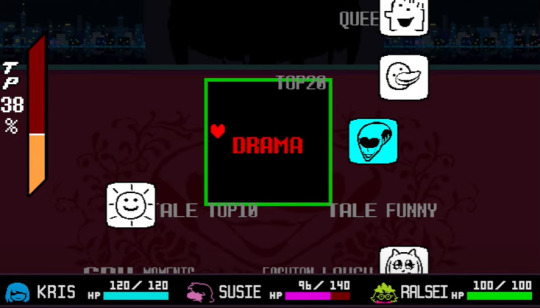
Even her name is a play on the word “drama queen”
The whole level is centered around a blue bird character, Berdly. A possible reference to Twitters blue bird logo. I mean, just look at her boss battle. If taken out of context, what do you see?
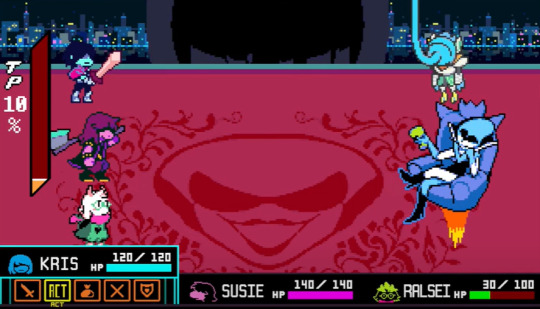
You see a person sitting in a chair controlling a blue bird to attack people.
Is that not Twitter?
Although its important to note that Berly himself doesn't seem to connect to this social media metaphor in a narrative sense, you could still argue that Berly's front of intelligence could represent how people act online, trying to appear as someone cooler and smarter than they really are.

Point being that like the first game, Deltarune was created to be a commentary on fiction and role play. The first chapter is literally about games, and this one is about our digital presence online.
Another more obvious reference to Twitter in the chapter is the sidequest about collecting “blue check marks:

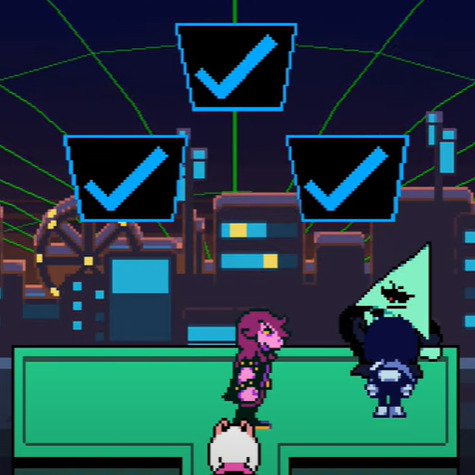
You have to bring the Hacker “checks” which could be a reference to “Verified Checks” on Twitter, and when you give them to him he creates a fireworks show “in dedication to you.” Symbolizing how for many people on the internet, getting a verified twitter check is the symbol of becoming famous, worthy of celebration. A sign that you've become a “big shot” now.
On that note, let's finally talk about Spamton.
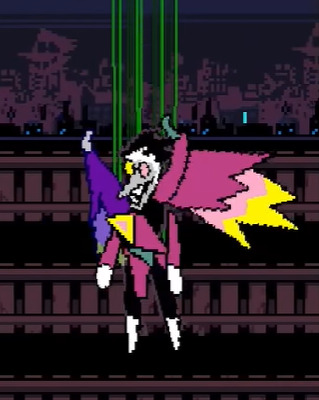
The most obvious connection is that Spamton seems to be like Mettaton.

Spamton and Mettaton have similarities, beyond their names. Both are “robots” that want to steal your “heart shaped object” to become big and powerful.
But the key difference between the two is the motive, and this is where the social media angle comes in. In the first game, we meet Mettaton who at first seems cut throat and sinister, but is revealed to have a real passion and dream. He wants to “get big” to make music that everyone enjoys, and even decides to stay behind out of an altruistic devotion to his fans.

Compere this to the cynicism of Spamton. Notice how in the first battle with Spamton you progress the battle by engaging with deals, but he doesn't seem to care about the money itself. You cant pay him off because its not about the money. He just wants to feel like a “big shot” making deals. The thrill and freedom of feeling like someone important.
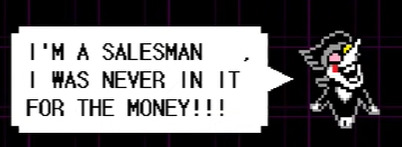
In this sense we can then divide Mettaton and Spamton into two types of influencers. Whereas, Mettaton has a dream. Spamton just wants clout.
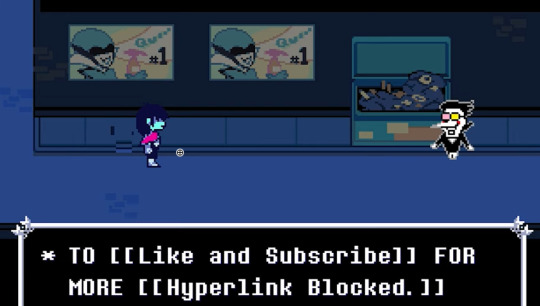
The kind of influencer who wants to use their platform to enrich themselves and fuel their ego, as oppose to someone like Mettaton with a real desire to change the world for the better. In one of the genocide routes, we can even see him take over Queens mansion, representing how these types of influencers are bound to take over the social media structure, sans the right people step in.
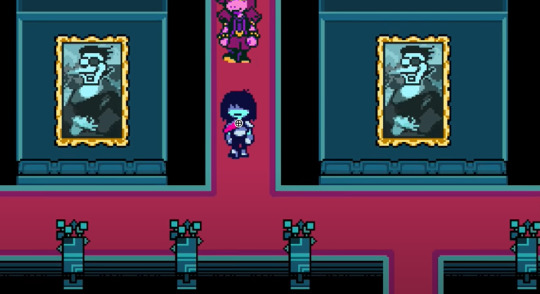
Given the social media and fame metaphor. Its impossible to examine this boss and not read into the context of its creation. Although this is purely speculation, its possible that Spamton was created as open meditation on Tobyfox's baggage regarding his own fame, and also the effects of social media fame and clout chasing in general. Imagine the pressure of being that famous, of everyone expecting you to follow Undertale with something just as good or even better, and Toby probably doesn't even know what made the original game blow up like it did in the first place, and probably never expect it to.
Consider this line in his first boss theme:
“... Now's your chance! Now's your chance! Now's your chance! Be a big- be big- beeee-”
Over and over. It can almost be read as Toby's internal monologue. An unrelenting pressure to outperform and succeed, to make sure the game is a success that fulfills everyone's expectations.
Simply put, Toby is a big shot now.
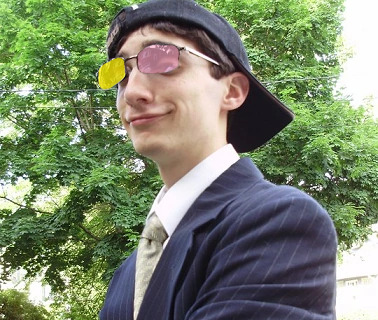
In the matter of a single year, Toby went from being a nobody on the internet to being twitter famous celebrity. Getting “calls” from Nintendo. Again this is all unconfirmed, but its even possible that Nintendo offered Tobyfox a deal. A chance to be a big deal, with a big salary; a corporate puppet.


Toby would (hypothetically) rejected this offer. Like Mettaton, he cares about his fans, but has no interest in the acquisition of clout and power for its own sake. But hey, that's just a theory.
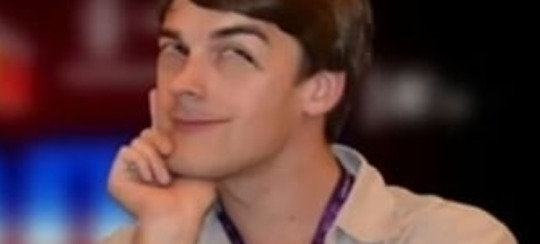
Which brings us to his central message about internet drama. While its not my place to psychoanalyze how someone is feeling from afar, a message is certainly here about internet fame and clout chasing. Its clear that Toby has become twitter famous, and consequently has found himself thrust into the heat of internet drama time and time again. It seems that Toby Fox is horrified by the affects social media is having on the indie gaming community or just more broadly society in general. In the past, toxic fame was a niche problem faced by a handful of Hollywood stars and musicians. But now Social Media has democratized fame, and all its problems to everyone that owns a phone.
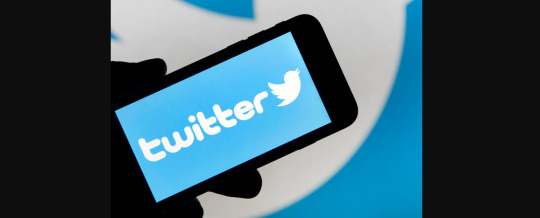
Chapter 2 seems to be Toby's response and warning: that being a big shot is not all its cracked up to be and certainly not worth parting your soul over.
205 notes
·
View notes
Text
Combing through every single episode of Jurassic World: Camp Cretaceous for Yasammy moments to write meta analysis about part 1 (parts 2, 3, and 4)
I really love the development of Yaz and Sammy’s relationship and how it starts with something as simple as Sammy wanting to reach out to Yaz and include her in the group’s activity, despite the fact that Sammy’s approach to forming connections with people can be a little intense at times (which is something that she gets better with as the series progresses) it’s actually just what Yaz needs, she is someone who is closed off and heavily guarded, I get the impression that she’s never had a real friend before because she’s always training alone and competitions are probably not the easiest places to make friends, Sammy asserts that Yaz is “just shy and doesn’t know how to make camp friends” and I think that’s Sammy picking up on the fact that Yaz is incredibly sensitive and self-conscious (which we can see when she finally opens up enough to share her drawings with Sammy) and is deeply afraid of rejection, thus she distances herself from everyone so she won’t get hurt (which she directly admits when Sammy says she wants to pull her out of her shell), Sammy’s determination to form a bond with Yaz is the main (if not the sole) reason that Yaz is willing to open herself up to making friends in the group and that’s a very big deal for her character development Yaz is resistant to this change at first, presumably because she’s never met someone she felt was worth the risk of making herself vulnerable before, she finds Sammy’s initial attempts to get to know her tedious and doesn’t take them seriously, given her “orange, orange, and orange” answer it seems like she might even being off-handedly joking as a diversion to keep Sammy from learning too much about her, when that doesn’t work and Sammy keeps trying to ask her about herself Yaz breaks out the sass with “I train. Alone. Quietly.” and “We should do that…later. Much, much later.” but we see when their gyrosphere gets blocked by a tree that Yaz is willing to work with Sammy in a non-personal context, she’s used to having professional and personally removed relationships with people so that’s where she feels most at home and in her element (just look at that confidence when she takes charge of the situation!) Also, as a side note, I had to include a couple of Benji clips in here because I love the way Ben is always clinging to Kenji and how that dynamic serves as a visual metaphor for Sammy and Yaz’s initial attachment once she gives Sammy a chance We start to see a bit of a turning point for Yaz in the scene where Sammy decides to go up to the triceratops that knocked her over, Yaz looks on in awe and confusion as Sammy approaches the dinosaur, even asking “Whaaat are you doing?”, but when Sammy says, “It’s hard to trust strangers, it’s a scary world out there, but I’ll trust you if you trust me” Yaz has a moment of realization (we can see it written all over her face): she is just like that scared dinosaur and Sammy has just been doing her best to try to put Yaz at ease This is the catalyst for Yaz opening up to Sammy, she’s still afraid of rejection and she doesn’t think anyone is really going to like her but she gives Sammy a chance anyway, confesses that she has a hard time trusting people, gives Sammy the real answers to her questions from earlier, and shows her the drawings she’s been doing, even as she’s doing this it’s obvious Yaz is worried that Sammy will put her down or think less of her, I suspect she may have been bullied in the past or possibly been in a toxic friendship or toxic relationship with her parents or something else similar that left her feeling like she has to constantly be on-guard about her interests and feelings, she’s utterly shocked when Sammy accepts and complements her and she’s even more surprised when Sammy hugs her, this is something she is initially resistant to because she’s obviously not used to closeness and affection but we can see her soften into the hug and place a hand on Sammy’s shoulder, this shows that even though she’s pushing herself well out of her comfort zone she’s willing to keep doing that for Sammy After that
point we see them together quite a lot, Yaz even lets Sammy watch her draw because she knows Sammy won’t judge her, Sammy’s unconditional support and encouragement now present Yaz with a new fear and she forms what’s called an insecure attachment to Sammy, this basically means she is so afraid of losing Sammy that see feels the need to cling to her side and seek her approval as much as possible, thus why she is so quick to defend Sammy multiple times against Brooklyn’s accusations about stealing the phone, she wants to stand up for Sammy and protect the relationship because she’s now invested in it and that has made her fear of getting hurt even more volatile Also Sammy grabbing onto Yaz for comfort when they see the guy get eaten? Yaz saving Sammy when she falls from the platform? Yaz holding Sammy and checking on her after they get her back on the platform? Sammy and Yaz holding hands after the zipline crash? The caring and support? *chef kiss* We can already see at this point that their bond has gotten a lot stronger by the way Yaz puts her arm around Sammy unprompted and they hold each other when the group decides to leave camp (with Sammy’s hand on Yaz’s waist, not a place you’d normally put an arm around a friend, suggesting Sammy feels especially close to her), we also see Yaz comforting Sammy (something Yaz seems nervous about based on her body language and the little hair tuck she does) and holding that giant leaf out of the way for her (with the added petty flare of letting the leaf go right as Brooklyn is coming up to it because Brooklyn’s accusations put her on Yaz’s shit list), their closeness is arguably even more obvious when the group finds out that Sammy did in fact steal the phone as part of her secret job as a spy for a rival of Jurassic World because Yaz gives Sammy a look of betrayal and hurt and her voice gets soft, almost pleading, as she says, “Sammy?” After they crash and Darius asks if everyone’s okay Yaz loses it, you can hear her voice breaking, her fear has just been realized, she opened herself up and trusted Sammy and defended her only to find out Sammy had been lying, the situation on the island is stressful enough but at least with Sammy around it had been more manageable for her, of course Yaz is angry but notice how the anger fades from her voice when Sammy comes after her and Yaz says, “And you…You…” because she can’t even finish her sentence or maintain her anger, Sammy’s violation of her trust has broken her, despite this Yaz still cares so much, when Sammy explains that she was spying that company to save her family's ranch you can see a flash of concern on Yaz’s face, she might be upset but she still doesn’t want anything bad to happen to Sammy However, Yaz pushes this feeling of concern down because she needs to confront Sammy about the betrayal, she’s angry at Sammy for lying, she’s angry at herself for putting herself in the position to get hurt again, and she wants to push Sammy away so she won’t get hurt even more, she wants to feel like she is in control again Despite how upset she is, Yaz still steps in to protect Sammy when the mosasaurus starts coming for Darius and Sammy’s kayak, she hesitates for a moment but then she decides that no matter what beef she has it’s not worth losing Sammy for good, you can hear the desperation in her voice as she calls out for the mosasaurus to come toward her instead of going after Sammy, here Yaz has been reminded of the fear of Sammy dying, obviously the whole group realizes they’re all in danger on the island and none of them want any of the others to die but this is the first time since Yaz and Sammy’s falling out that Sammy’s life has been in immediate danger and with everything else going on Yaz can’t stand the idea of losing the closest person in her life forever Sammy is terrified for Yaz’s safety as she rides away from the mosasaurus and crashes down, breaking her ankle, Sammy is the first one to rush over to Yaz’s side and she reaches out both hands to steady her, Sammy clearly cares about everyone in the group but she
seems to hold a special place for Yaz, I think that she has started to catch feelings but I’ll talk about that in later parts of this post series
42 notes
·
View notes
Text
My two cents on the devolution of fandom spaces...
As a former mod of a fandom space and a woman of colour, I do not feel safe.
Seeing what has been done to so many in this fandom, by a particular group of white American women, in the name of moral policing is both abhorrent and demoralising. As it also is to repeatedly see the same narrative being shoved at everyone as the gospel truth.
A narrative that very conveniently either becomes about fic or has nothing to do with fic, depending on how people want to swing things. A narrative that will accuse a person of Jewish heritage of anti-Semitism, a person of colour of racism, a practising Muslim of being an Islamaphobe. A narrative that will define for you and me and all of us comprising this myriad of multitudes in the world what generational or personal trauma includes and what induces the same.
Those of you who know me, know what I’ve been dealing with the past few days & why I haven’t spoken up before now. Before I logged out a couple days ago, I saw what looked like more of the usual nonsense by the same group of people I’ve kept my distance from once their true colours were revealed. What I didn’t expect is that they would think themselves so above the norms of human decency and accountability that they would go after not one but two women of colour this time around in their rabidity. And many others who spoke up, as it turns out.
It hurts to see what these women, that I know of, have had to endure and to see the passivity of the community, save for a few voices, in sitting back and letting the circus rampage through town. It hurt when I was at the receiving end of it and it hurts now.
Why? Because it shows me a microcosm of the world that I don’t really relate to, that makes no sense to me with the values I was brought up with, and which reduces basic human decency to a commodity to be trampled upon and for you to be seen as weak for having. Because people who willingly laud you for your art / writing / wit, meet you with effusive claims of love and affection and friendship, who have no qualms in taking your help when it suits them, will throw you under the bus and let the wolves ravage you when it doesn't.
Before I get into that, let me talk a little bit about what has transpired over the past few days to a week, and what has been systemically taking place over perhaps the past year in this fandom.
One thing is that everyone who makes a statement about anything suddenly has people in their mentions demanding they show what gives them the right to hold that particular opinion. A critical thing people forget about fandom is that it is a place where people hide their identity for a variety of reasons, all valid, and this approach to fiction and conversations where everyone has to reveal every part of their past and identity as a means of establishing their "credentials" in order to present their views comes in direct contradiction with how fandoms operate. It violates people's rights to privacy.
The other is that there has been an increase in the voices that purportedly stand up to “speak for” the marginalised, the abused, those discriminated against and those who belong to minorities who “need to be protected / kept safe”. An admirable sentiment, to be sure. If it weren’t for the fact that none of these groups of people needed saving, speaking for or the protection of this particular group of voices.
Voices who only want to define and use these people as "model victims" to hurt other white women and establish their supremacy over both them and other POC. Voices that will present their "truth" as they see fit and sans context or present you with screenshots of snippets of conversations held in supposedly secure spaces that they have no qualms in violating in the interest of the "greater good" and claim offense / silencing if the misdemeanour is pointed out or action is taken against them, Voices that will conveniently categorize you as a "token POC" or "white adjacent" when you do not support or align with their narrative. Voices that belong to a predominantly white American group of women, whose real agenda, as is evidenced by their modus operandi, has nothing to do with real altruism or a drive for justice or indeed to right wrongs.
No, their agenda is purely power.
To hold sway over groups of followers, to shepherd them as though they are sheep who cannot think for themselves, and to set themselves up as white saviours who call out those who step out of line, or are deemed to be problematic and toxic and unsafe. To be the owners of the only "safe spaces" in fandom and to drive other groups and spaces to be boycotted or worse.
Now, I've long wondered, who indeed are these women to decide that for anyone? In a world comprising multiple cultures, religions, groups, subgroups, genders and which contains multitudes, who are these women and what gives them the right to foist their puritanical standards on everyone, very conveniently disguised as concern for the moral well being of everyone and the consumption, of all things, of fiction?
Certainly, there are many things in this world that people regard with justifiably equal dislike / horror / sadness. At the same time, there is much that is not shared, that is particular to a culture and to a person’s background. There is a multitude of perspectives that make the whole. And the white women of the United States of America have not cornered the market on what those are, or indeed even own any curatorship or censorship of the same. They cannot, because each person’s culture and background and joy and trauma is their own, as are their ways of dealing with it all.
That being said, let’s talk about their pack behaviour and the devolution I’ve witnessed on social media as basic human decency is bartered for clout.
I’m all for standing up for someone who doesn’t have a voice or a platform, or maybe afraid of repercussions to voice dissent. I’m all for being there for our fellow human beings as they face struggles of often unconscionable and unfathomable proportions. I’m all for holding people accountable for their negative behaviours as they impact the larger community.
What I am unequivocally NOT for is treating such situations as an opportunity to preach, to virtue-signal, to shame and to put on blast the alleged wrong-doers. I say alleged because that’s what most accusations are on these platforms—allegations to do with things that disturb our sense of balance or make us wrinkle our noses or that we deem bad, and therefore make the accused deserving of the full force of the community’s misbehaviour and censure.
I ask you if you were found guilty of a crime in real life—you know, the one away from your phones and keyboards—would you not have an opportunity to retain a lawyer, to plead your case in a court of law, to acquit yourself? Or, if found guilty, would you not have the opportunity for correction and rehabilitation? Yes, you say? (If you say no, then that explains the spate of state-perpetuated injustices across the USA, but that is a different matter).
Why then are people treated so abhorrently in this court of public opinion? What gives you, me, any one of us the right to judge people so vilely and with a metaphorical gun to their heads? What gives anyone the right to say you better agree with everything I say, retract everything you said and grovel for it or we will eviscerate you in public, shame you, force you to change or delete the content that offends us and still ostracise you and in some cases even threaten you with bodily harm or death, or doxx you?
Why is there no grace in how people are approached or dealt with? Whatever happened to allowing people to learn from their mistakes, where applicable, or hearing them out and giving them a chance to explain their side of something we may not fully understand?
Why is there no accountability for such behaviour on the part of the accusers?
What makes the rest of you sit back and allow this to happen? What makes you think this is in any shape or form okay to watch? Today, it is a virtual stranger at the receiving end, one you can distance yourself from quite conveniently saying Oh, she just mods a group I am in, or I only read their fics a couple times or I only followed them for their art or jokes or whatever flavour of excuse you choose. Tomorrow, it will be one of your own - or it may very well be you. And you'd better hope there's someone left to speak up for you.
The irony is you will have allowed it to happen by letting the wolf in the fold. By letting these white women manipulate you, and the community you claim to be a part of, so unapologetically, so maliciously and so unashamedly that before you can do anything about it the cancer has taken hold.
If this was happening in the world outside of social media, they would have to follow due process, to present real evidence based on facts (not based on emotions, rumours or perceptions) and would have to allow the person they are accusing to present a counter-argument, to defend themselves or be defended. Failure to do so is a miscarriage of justice and, depending on whether this is a professional or legal proceeding, they would either seriously risk their jobs or have the case thrown out of court. If not face action themselves for attempting to derail the process of justice.
Why then are they permitted to range so freely through the landscape of fandom, snarling and biting at who they please, or who displeases them?
I have no shame in saying I was at the receiving end of their behaviour for defending a friend they put on blast and I will tell you right here and now, I am a woman of colour who feels unsafe and attacked by these so-called self-appointed white saviours of your social media experience, these so-called upholders of the common morality—whatever that means—who will fight for you the evils of problematic and toxic writers who dare to have an opinion not aligned with theirs and who do not bow to their clout. Not that they care, so long as they can ignore this fact since it doesn’t fit their narrative. So long as they can ignore what has just been done to so many people in the name of cleansing the fandom.
If any one of these women were truly interested in alleviating the troubles and pains of the discriminated, the marginalized, the trauma-affected, I invite them to please come roll their sleeves up and help in the multitudes of troubles that wrack this world, not just in the backyards of their minds. My country is amidst a struggle for the basics of human life in this horrific pandemic and, prior to that, for basic constitutional rights for religious minorities. Do not patronize me and lecture me on trauma and racism and discrimination. Do not marginalise me in your attempt to pontificate and set your pearl-clutching puritanical selves above the rest, or assuage your white guilt.
A largely American audience or fanbase in this fandom is purely a function of access and interest—other cultures have vast followings for things you couldn't begin to fathom—and it doesn't mean you are entitled in any shape or form to be spokespeople for the rest of the world. We have no interest in being colonized again by white oppressors.
If you disagree with what I have said, I congratulate you on being a part of their coterie and wish you much joy in being the sheep in their fold. Kindly unfollow or block me on the way off of this post.
#fandom#fandom culture#bullying#gaslighting#gatekeeping#minorities#people of colour#real talk#toxic people#problematic behaviour#problematic authors#problematic fiction#fanfic#reylo#reylo fanfic book club#reylo fic recs#trauma#safety#accountability
64 notes
·
View notes
Text
“Hey Arnold!” and “Miraculous!” parallels
Ever have an idea for a post that you take forever to get around to because 2020 is
actively
trying
to kill you?!
Welp, that’s me. I mean, uh, this is that post.
Long post is long and I don’t like cuts cuz I’ve lost a few posts in the past using them. Please filter the tag “long post” I use it for walls of text like these.
So there’s this show from my childhood called Hey Arnold!
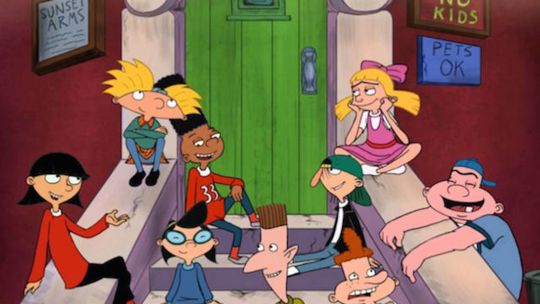
Having been on air before I had cable (I and my unsupervised brothers and sisters spent our childhood watching Jerry Springer and Maury because there was literally nothing else on our cheap little TV. How hilarious is that?) I didn’t really have much of an experience with Hey Arnold! aside from brief little glances at it when i visited a friends home or the rare occasion where they showed cartoons at school. By the time I got satellite, the show was no longer on the air save for some late night reruns and the Christmas special which aired in December along with other Nickelodeon Christmas episodes (THE best Christmas episode EVER btw).
Really I couldn’t remember much about it until hearing about the Jungle Movie finally getting a release date (a total flop but at least its no cliff hanger) and decided to re-watch the entire series in preparation for said movie.
By which point I had discovered another show—Miraculous.
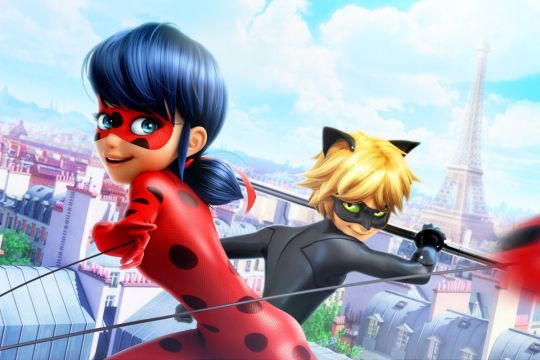
At first glance the two shows have absolutely nothing in common. Miraculous being a French-born mahou shoujo-esque CGI superhero TV series about a couple of middle schoolers who regularly battle a walking peppermint-frappucino-looking psychopath. Hey Arnold! being a more realistic children’s sitcom about a young football-headed boy who deals out humanitarian aid in the form of advice and simple good deeds to his neighbors, classmates and friends.
In terms of setting, logic, and animation the two series are as different as night and day.
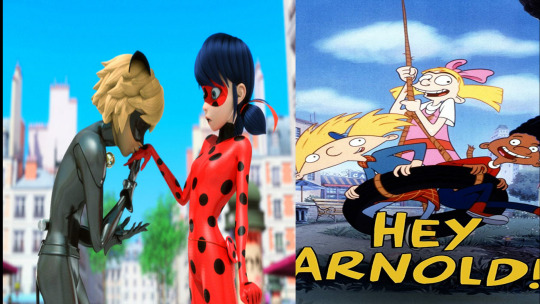
So imagine my pleasant surprise to discover a whole post’s worth of parallels shared between the two shows???
And here they are in no particular order:
1)Arnold’s Parents/Adrien’s mom
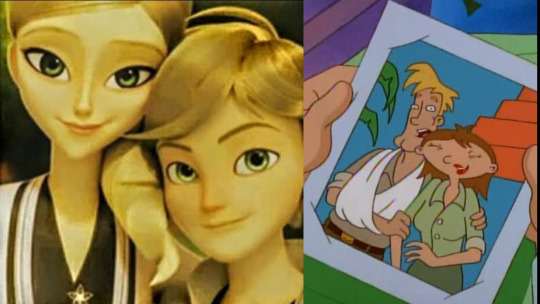
Prior to the start of Miraculous, Emilie Agreste disappeared under mysterious circumstances leaving her family behind. Later on it was revealed that she was in fact sleeping (dead?) in a glass coffin beneath the Agreste mansion--unbeknownst to Adrien, or anyone else in Paris save for Gabriel and Nathalie.
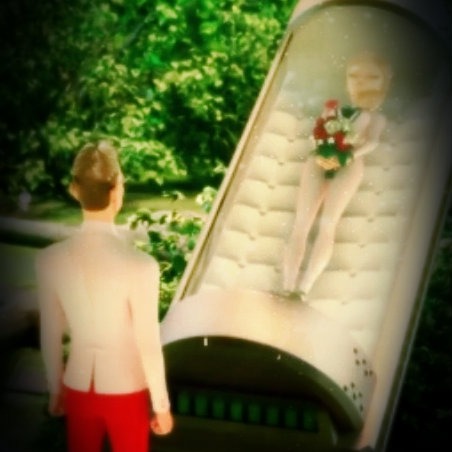
In a similar fashion, Arnold’s parents, Miles and Stella, also disappeared prior to the start of Hey Arnold! and like Emilie were always referred to as “missing” rather than “dead.”
The Jungle Movie later revealed Miles and Stella weren’t dead, but like Emilie appears to be doing in her coffin, they were sleeping. Having caught a bout of sleeping sickness (apparently they do not need to be hooked up to IVs or other medical devices while in a comatose state cuz fuck logic) they simply needed their orphaned son to come and cure them with the help of the magical golden heart Helga provided him with.
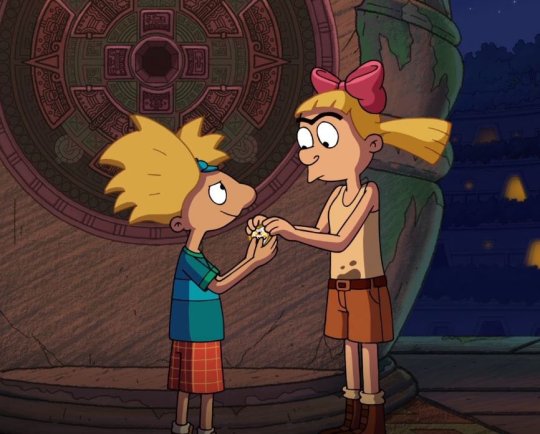
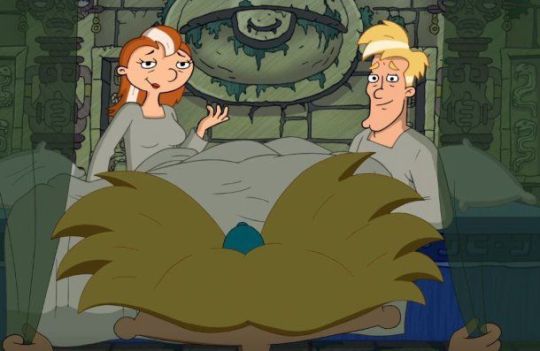
Perhaps Mari holds the key to waking Emilie? That would be nice to see.
Not the miraculous of course--but some other key.
Although personally I’m hoping for a hardcore, devastating ending like Emilie dying, Gabriel going to prison where he belongs, and Adrien leaving the country for a bit until the second Hawk Moth shows up because I just like devastating cliffhangers and angst and being in utter turmoil over fictional people. But that’s just me.
2) Their best friends are dating
Smol parallel here: Arnold’s best friend Gerald and Helga’s Best friend Phoebe wind up together in The Jungle Movie after being imprisoned together by Lasombra. Similar to how Nino and Alya ended up together after being imprisoned by Ladybug (for their protection, of course).
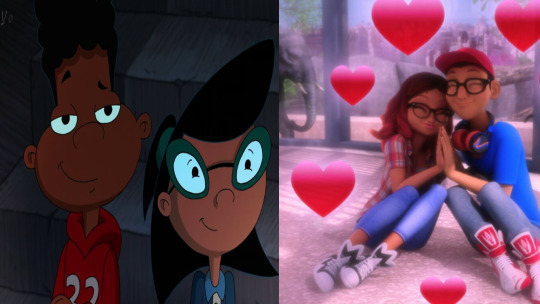
3) The Bag of Money Episode/ The Ladybug episode
OOh boy both of these episodes make me rage.
Some context about the Bag of Money episode: Arnold and his friends Gerald and Sid find a random bag of money containing almost $4000. Sid is ecstatic and wants to split the money evenly between the three boys, but Arnold worries it could just be lost and convinces them to let him, Arnold, take the money to the police station. On the way he accidentally switches the bag with another one that is identical and contains a bunch of useless junk, and when he tries to explain what happened to his friends they don’t believe him because their bag of money was accidentally taken by an “old lady with pink hair and a peg leg.”
Arnold’s a good boy and he’s telling the truth--but the truth sounds crazy, even to my ears. Sid accuses Arnold of stealing the money and spreads lies to their classmates, whom Arnold has spent the ENTIRE SERIES helping in some form or fashion. Despite everything he’s done for them though, the vast majority of the class come to believe Arnold is a thief. Even Gerald, Arnold’s closest friend, nearly believes Sid over Arnold but eventually comes to Arnold’s defense. The other kids (save for Helga who doesn’t really make an appearance this episode) gang up on Arnold, but thankfully the old lady with pink hair and a peg leg shows up with an officer and together they explain the bag of money is now at the lost and found where it will remain and if gone unclaimed will be returned to Arnold, Gerald and Sid.
Pretty much everything is resolved and things return to normal between the kids.
But I hate this episode. I hate this episode so, so much. Arnold has spent the entire series helping these people out in some form or fashion. Literally thats the entire show. And after everything he’s done for them they’re so. Quick. To. Turn. On. Him.
Sound familiar???

4) Hidden Personality vs. Surface Personality
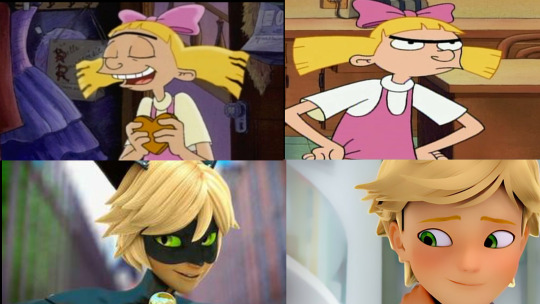
I do not refer to the cruddy “true selves” thing half the Miraculous fandom believes in. Depending on one’s individual circumstances, environment and how comfortable they are, said person’s behavior can fluctuate or even do a complete 180. This can be kinda frustrating when dealing on one’s own--”Who am I anyway? Is that me or is this me???”
It’s all you, fam.
Arnold and Helga are themselves too, no matter what metaphorical/actual mask they put on. There’s the side that everyone sees and then there’s the side almost no one sees. The hidden personality isn’t hidden due to a lack of trust, necessarily, but rather it is the result of retreating to their respective “shells”--ones which both Arnold and Helga were kinda punched, kicked, and shoved into.
Helga’s surface personality: Class bully, puts up a tough front, constantly torments Arnold because she can’t stand him and his niceness
Helga’s hidden personality: Poetic, abused and isolated, is in love with Arnold to the point of being obsessed with him and bullies him via surface personality in order to hide that fact
Of course Adrien is no bully--his reasons for not being the “cunning, funny, ultra-charming Chat Noir” 24/7 DOES have a lot to do with his toxic household, his dad, and the overwhelming expectations which are constantly smothering him as Adrien.
Adrien is a bug under a magnifying glass (or so he feels)
Chat Noir is a chance for a freedom.
Adrien’s surface personality was molded by his dad.
Helga’s is the result of her entire family. Her father is brash and loud, her mother is a confirmed alcoholic, her sister is a gifted prodigy, well-rounded and spends most of the series at university or elsewhere. Although her sister, Olga, has been shown to genuinely care for Helga, Olga is kinda the reason their parents neglect Helga. With their first daughter being the genius and prodigy she is, Helga’s parents poured all of their pride and affection and parental devotion onto her. Meanwhile Helga had to walk to pre-school alone. At four years old. In the rain. Not for the last time.
Which leads me to the next parallel.
5) Umbrella in the Rain
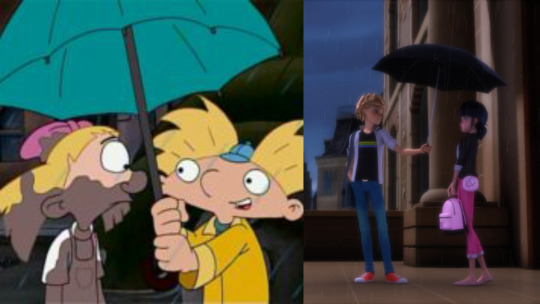
squeals in delight over this parallel<3<3<3
If you’ve never seen Hey Arnold! do yourselves a favor and watch this short little clip over how Helga and Arnold first met. If you have seen it, watch it anyway because it is the most adorable clip in the entire show.
youtube
Dr. Bliss: “So nobody’s ever noticed you?”
Helga: “...There was someone.”
The soft way Helga confesses that--you can actually hear how grateful she is to have such a tender memory from such a painful time.
In a similar manner, Adrien offered his umbrella to Marinette. Of course Adrien did it because Mari had to walk home in the rain and Arnold did it as a simple gesture of kindness (seeing as they were already at the school)--one of the many kind acts he displays throughout the series.
But just like Adrien needed unconditional love coming from somewhere, so did Helga. They were both denied this one common necessity which everyone else around them had. It’s not a lot to ask for, and they should’ve already had it coming from their families--but they didn’t.
And then, one rainy day, there it was--the unconditional love they needed.
6) Clinginess
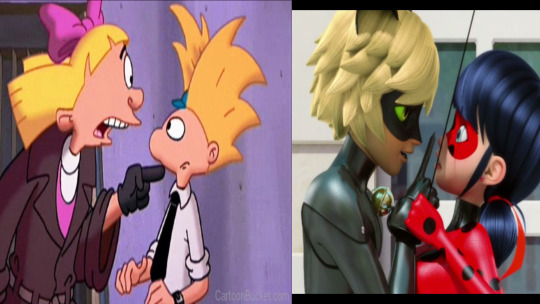
What happens when you take someone, specifically a love-starved abused child from an unstable home environment--deprived of the one thing most crucial to their mental well-being--and miraculously provide them with that very necessity?
Clinginess.
I can’t really think of the correct word to describe this. “Clinginess” is pretty close to what I’m trying to describe, if not on point, so let’s go with that.
What I mean is Helga and Adrien both need Arnold and Ladybug respectively. That’s not a bad thing--it’s okay to need somebody else. What’s bad is hinging your entire being on this one connection. For if either kiddo were to be left behind they wouldn’t handle it very well.
It can’t really be helped with either Helga or Adrien. They didn’t really have the option to learn certain things and went deprived of unconditional love for such a long time. They’re kids--nine and fourteen/fifteen respectively. They’re not perfect and they’re traumatized for life. Being denied love from your family--the very people designed to love you--would do that to a person. Naturally they would cling to the first people to show up and provide them with the love they needed.
The Hey Arnold! wiki says this about Helga and Arnold’s relationship
Due to her unstable family upbringing where both her mother and father constantly neglect [Helga] and shower all of their attention onto Olga, leaving her deprived of the love and attention she needed growing up. On her way to preschool, Arnold helped her by keeping the rain off her with an umbrella and even complimented her on her hairbow. He even later gave her crackers during their snack time. Arnold's kindness and being the first person to notice her quickly caused Helga to transfer all of her love and attention to Arnold.
Of course Adrien’s tunnel vision isn’t quite as bad as Helga’s.
He treats his friends better.
He does love his father--
Even though his father is THE.
WORST.
PARENT.
EVER!!!
--because he’s Adrien and he’s just too precious a cinnamon roll and that’s still his dad even if the man does belong behind bars.
7) Unhealthy Obsession
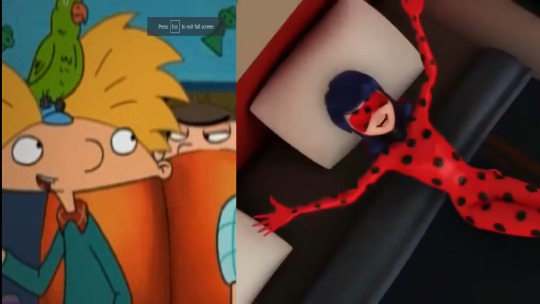
I--
I...
Ugh. I am not going to delve too far into this. You’re just going to have to take my word for it. Helga’s creepy stalker behavior is a thousand times worse than Marinette’s. That pic up there of Helga hiding out in Arnold’s room watching him is pretty decent evidence to back up my argument, but it’s hardly the only example or even the worst incident.
Honestly I’m amazed at what Nicktoons were able to get away with in the late nineties/early 2000s.
But yes, Helga’s obsession with Arnold is rather unhealthy in the most extreme moments leading her to display behavior which is more often than not disturbing and concerning.
The Hey Arnold! wiki has this to say about Helga’s obsession with Arnold
Helga is possessive of her love for Arnold and thinks non-stop about him to the point of obsession. This is evidenced throughout the series by the many shrines and poems she makes of Arnold and of her frequent dramatic soliloquies about her love for Arnold.
Again--Mari isn’t as bad as all that. She’s a sweet girl with many healthy relationships in her life. She has ambition, creativity, and drive. But yeah she can be rather possessive of Adrien too, and that needs to stop. Like right now. Adrien doesn’t need another girl being possessive of him and thinking he’s perfect--he needs someone who acknowledges him as a flawed person and loves him despite that.
As for Helga and Arnold--show creator Craig Bartlett confirmed they are “made for each other” and wind up married with three kids, so I’m guessing Helga grew out of some of these bad habits? Or at least I hope so...
8) Helper/Humanitarian tendencies

As mentioned before, the plot of Hey Arnold! is more or less about Arnold helping people. As stated by Gerald in The Jungle Movie, “He’s a humanitarian! Like his parents!” Of course not every episode is about Arnold helping people. There are episodes devoted to supporting characters and they’re just as enjoyable and satisfying.
But as he is the titular character he spends a lot of time in the spotlight.
Remember that “best christmas special EVER” episode I mentioned before?
The reason it’s the best special, in my less than humble opinion, is due to a few things.
The special is not about Santa Claws. In fact, I don’t think he’s even mentioned, let alone shown and treated like an actual living character.
The focus on the entire episode is again on Arnold helping someone, but he doesn’t succeed. Not really.
The one who succeeded in helping someone was Helga, who accomplished the goal Arnold had set out to do.
The episode deals with some rather dark subject matter and is actually quite heartwarming as the “perfect present” Arnold was trying to provide someone with wasn’t something you can buy in the store
It’s also one of the episodes where Helga’s love for Arnold leaves her to do good and as her love for him is a secret, she expects nothing in return. She’s just happy to help him.
Kinda similar to Mari who is, as Adrien puts it in Mayura, “Our every day Ladybug.” Her kindness and devotion to helping others is what drives her as Ladybug and Marinette. It’s what brought Ivan and Mylene together. Is the reason Nathaniel and Mark now have a comic book together. And at the end of the day, that’s the reason for her strange behavior around Adrien--she wants to help him. Even if it’s just as a “good friend.”
9) There are two main characters
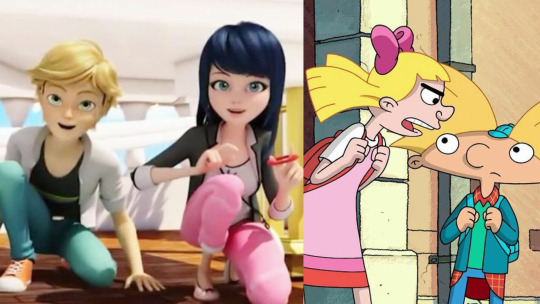
Although Hey Arnold! is technically a show about Arnold, one could argue it is just as much Helga’s story.
Similarly, Miraculous: Tales of Ladybug and Cat Noir is named thusly in order to convey the fact that Adrien is just as much a main character as Marinette is.
Although I must say Hey Arnold! did a much better job of giving it’s co-character their dues. GIVE. ME. MORE. CHAT NOIR. FOCUSED. EPISODES. DAMMIT.
But, yes, in terms of screen time, Helga gets about as much as Arnold does. Her story and struggles were given just as much importance as Arnold’s and many people have even come to believe that the show is really about Helga. I’d say its about both of them.
10) Constantly bumping into each other
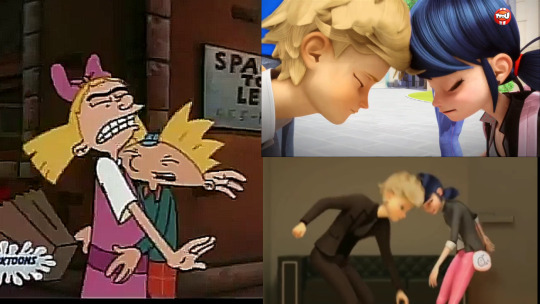
Granted this happens between Arnold and Helga more often than it does to the love square dorks.
But yes the two people meant to be together keep knocking into each other in their respective universes.
I forget who, but I remember reading that someone a while back theorized that this was the universe’s way of trying to push Arnold and Helga together. Kinda like the “Now kiss!” meme
Perhaps it’s the same for Adrien and Marinette?
;)
66 notes
·
View notes
Text
Morality-Focused Frameworks Of Discussion As Acts of Control
This is a post in response to a larger conversation I’ve been having with @eshusplayground. I have a perspective that I think would be really relevant to the conversation but I also don’t want to derail the specific focus of the following posts she’s been making recently.
(Trigger Warning For Abuse Discussion and Brief Mentions of Rape)
---
So I’m in the Hellraiser fandom. More specifically, I’m a Pinhead/Kirsty shipper.
For those of you that don’t know, Pinhead is a demonic torturer from hell who’s design is inspired by the BDSM community. Characters who open a magical puzzle box have unknowingly given themselves away to his violent underworld community of eternal torment and depravity. Hellraiser is a film about romantic and sexual horror, and there’s quite a lot in there about abuse and trauma. Kirsty is a traumatized person, and in my personal opinion, very likely a CSA victim.
And I ship these two characters together.
So the subject matter of my particular fandom is extremely intense and niche and complicated to navigate, although YMMV (I have no trouble with this franchise, but I cannot really handle GOT or American Horror Story, for example). After I grew interested in Hellraiser and integrated into it’s fandom, my perspectives about the way we have conversations about villainous characters started to have a major shift.
I often see people have these intense conversations (and arguments) about where a particular character exists on a moral scale, with the subtext (or outright text) that if they tip too far one way or another, they can be rendered unworthy of their own subgroup of fans within their own fandom. People who love those characters or find them shippable are then subject to moral judgements.
So how does one apply such logic to a psychosexual torture demon?
The answer is you can’t.
The frameworks people online use to have these discussions do not make any sense when talking about my fandom. Hellraiser is a dark horror fairytale presenting disturbing, surreal images and behaviors in order to discuss complex and difficult experiences and perspectives. The monsters within it, like Pinhead, are more metaphor than anything.
Now, my follower count is too low and my fandom is too niche for me to really be on the receiving end of a lot of the cruelty that manifests online about the moral validity of the fiction I enjoy. That said, between the anti-kink TERFS and the younger folks involved in purity culture on this site, I can imagine exactly what it would look like. You know what they would look like.
“You’re an Abuse Apologist!”
“You’re an Abuse Fetishist!”
“You’re reinforcing sexism!”
“he’s an irredeemable torturer, you’re probably okay with literal real world rape lmao uwu”
“This is bad kink representation and you’re complicit in the abuse real men do to women because you like this!”
Now, setting aside the fact that the canon lore context of Pinhead involves him having a human soul brainwashed by a monster god to become what he is, and is also in a roundabout sense “redeemed” in canon, I think most people utilizing this kind of framework would assume that I believe Pinhead can be redeemed in the way online Discourse (tm) means it, because that’s how we talk in fandom about the villains we really like.
I do not want to redeem Pinhead. I don’t think he even needs redeeming. I don’t even see value in that conversation at all. Redemption is not a concept that makes sense for what he is, or what he could become as a character. The framework of Pinhead as a Real-World-Equivalent Human Male Abuser who Cannot Be Redeemed From His Actions would inevitably dominate all conversation, regardless of the fact that it is inherently incorrect and detrimental to real, robust literary analysis of the narrative he exists within and how brilliantly it actually interacts with male on female abuse as a subject. By nature of it’s gross oversimplification and misrepresentation, It ruins the potential for greater, more nuanced and complex conversations.
And that’s the thing: my engagement with this particular story and it’s characters has a lot to do with the potential in the narrative to examine how trauma interacts with love, desire and gender politics. Hellraiser has a very unique way of exploring that kind of subject through a storytelling aesthetic that appeals to me (horror/fairytale, gothic romance, etc).
This is about to get personal, so strap the fuck in.
I am the victim of gendered abuse, in that I had an emotionally abusive step father and sexism was absolutely a factor in why that manifested the way it did. I am also a second hand victim of gendered abuse, in that my biological father was a serial stalker and rapist, and other male abusers (or just self-centered family members) caused severe emotional destabilization in my childhood. I grew up viewing adult men as unstable, selfish children. My family endured a lot, and I came to resent the men in my mother’ life for not taking on the role of protector and nurturer when she needed them most. I had discovered the great lie of traditional masculinity: in the face of real crisis, grown men were not protectors. They did not hold together the domestic space. They abused or faltered and abandoned us. This was a repeated pattern among several men in different roles. I was often left picking up all the pieces, taking on roles as a child that these men could not. I had to have strength they did not.
My experience of desire for romantic intimacy with men and men in roles of stable, nurturing authority now inherently involves a jumbled emotional soup of fear, pain, and a deep longing that comes from a place of feminine vulnerability, a desire to be taken care of instead of being the caretaker.
The narrative of Hellraiser pushes a lot of buttons for me. It speaks to my own trauma experiences in a very specific way. In an effort to further that conversation, I’m trying to create a piece of art (a fic) inspired by the deeply personal feelings this film gives me.
For me, Pinhead represents the Jungian shadow masculine, a simultaneous mix of fear and desire, the potential for suffering and pleasure, and everything in between. These experiences are inherently intertwined for me. And Kirsty’s experiences mirror many of my own.
In other words, in order for me to get out of Hellraiser what I get out of Hellraiser, Pinhead has to be exactly what he is, and everything that he is. Which includes monstrosity. Which includes the potential for change. His place in the narrative must fully, truly embody this conversation I need to have with masculinity, which inherently involves painful, scary things.
Anybody demanding that I either denounce my interest in him as morally offensive because he’s a monster in the full sense of the word (and not just the aesthetic one like what is currently trending in Monster Boyfriend fandom), or force a traditional redemption arc upon him as if he were a real life human person who must repent for his real life sins, are essentially saying that I am not allowed to engage with this work of fiction in a way that is transformative for me. And that’s very unfortunate, because honestly, I think my perspective is so much more dynamic and has so much more to offer.
This is not just about basic catharsis. This is not even a power fantasy about emotionally transforming a powerful (white) dude, or “bad boy” fantasies, both standard arguments for villain stanning that feels like it has never truly represented me or the complexity of my experiences and interests. This is a full-on conversation and act of self expression I want to have through art about the experience of fear and trauma when dealing with men as a woman who desires men.
And I don’t think a person has to be traumatized in order to want to engage with this type of fiction. I want to be clear that my experience is not a justification for my interest (I do not need to justify myself), it is an example of a perspective that gets erased by the framework of these conversations.
To me, the framework of moral validity for enjoying fictional villains and monsters and whatever you please feels incredibly stifling to the complex, dynamic ideas and analysis that I want to engage in, because I, and many people I know, are consistently pressured to structure their thoughts with this framework as the only acceptable baseline of discussion. This is so ubiquitous that when people I’ve known have tried to engage in ways that diverge from that framework, the responses they get are outright confused or direct the conversation right back to the original framework they tried to avoid. Complex conversation gets steamrolled.
Somewhere in the conversation we were all having about acknowledging and discussing abuse and oppression, and acknowledging troubling patterns in media which reinforce the normalization of abuse and opression, some people decided that there was a very serious moral discussion to be had regarding the mere act of liking things which involve dark subject matter and complex, or even monstrous characters. They now argue that there are very clear cut, simple moral frameworks for A) telling stories and B) enjoying stories, and most importantly, that this moral framework is a valid justification for the social treatment and silencing of certain people.
A framework, by the way, which I think is actually not functionally a framework, because like the toxic American fundamentalist christian groups it’s thinking is structured from, it does not account for the vastly diverse moral landscape within it’s own space. There is no objectively consistent body of knowledge anybody is working from, because morals are derived from the human experience, which is inherently subjective.
Interestingly, no where does this have more of an impact than with marginalized people, and people like me, who want to express something deeper and more meaningful in the conversation about abuse and oppression than what this framework really offers us. To be honest, The more I see this kind of conversation making the rounds, the clearer it becomes that it’s a means of control and power game playing. It’s not about morality, but about how morality can be leveraged in order to silence truly diverse and nuanced perspectives and uphold people’s sense of self-comfort. It is a means of supplanting more convenient and easily digestible understandings of these highly complex subjects that require more intensive, thoughtful engagement, especially when it gets challenging. This kind of rhetoric absolves people of making room for complex and diverse experiences, and reinforces an (at face-value) easy to follow set of moral rules of how we are all allowed to think and feel.
The implication of all of this is that if we all adhere to the One True (alleged) Moral Framework of Fandom Engagement, then we will somehow come out on the other side with all the Good People having a Great Time having Squeaky Clean Fun. And I don’t think I should have to tell you at this point how stifling and disturbing the implications of that kind of mentality really are.
Quite frankly, I think a lot of us are very tired of constantly speaking on other people’s terms.
32 notes
·
View notes
Text
Literally can't stop thinking about "You have indeed felt a great loss. But love is a form of energy, and it swirls all around us. The Air Nomads' love for you has not left this world. It is still inside of your heart, and is reborn in the form of new love" and how much the concept of this quote pretty much applies to the main characters within atla, especially in regards to their development and central arcs throughout the series and how it plays a big role in their journey, either on a large scale or a more subtle one.
Aang's is the most obvious and is the original context of this quote. His love for the Air Nomads and their love for him is reborn in his love for Katara and vice versa. These two develop an instinctual bond as soon as they meet and get along very well, providing each other with support in overcoming the trauma, a listening ear when things are rough or standing up for the other when they encounter obstacles, especially ones related to their bending. They supply each other with the home and understanding that has been lost as a result of the war. Aang's love for Sokka can be interpreted in the same way, who forms one of the first bases for Aang's second family after the loss of his entire culture. It's not just that though, there's also the gradual trust in each other's leadership skills, reaching its zenith in their preparations for the invasion of the Fire Nation capital.
Katara's reborn love is likewise Aang's as well, and I think the best way to demonstrate this example is paralleling Aang's actions in the second episode of book one when Zuko and his crew attacked the South Pole and Kya's in the flashbacks of the Southern Raiders. Both are people who meant a lot for Katara and who at that point helped in shaping her view of the world, since Kya raised her and Aang even in the short span they interacted reminded her of the joy of enjoying her adolescence and having fun. Both did not hesitate to offer themselves up for the Fire Nation when it became clear that Katara and the village was in danger and both made a conscious effort to reassure Katara during those sequence of events. Of course, Aang and Kya didn't have the same outcome but that's not the point.
Zuko's is Ursa's and Iroh's. It's not a reborn love in the literal sense but for all intents and purposes, the result is largely similar. While we know from flashbacks that Zuko was very close to his uncle even prior to Iroh losing his son and events leading up to Zuko's banishment, the fact of the matter is that Ursa is shown to be his primary caregiver, the person who works to do whatever they can to shield him from Ozai's abuse and someone who inspires a lot of his conceptions about his self image, particularly his persistence in the face of adversity and failure. Once Ursa is no longer in a position to continue doing so, that role is then taken up by Iroh who continuously makes every effort he can to support Zuko through the worst period of his life, providing the love and care he needs in order to heal, standing against the harm Azula and Ozai attempt to inflict against him (often literally) as well as teaching him the tools he needs in order to continue building his separate identity outside of the toxic ideals of his family. Whether that is in relation to Zuko's bending and the way he's been branded as the less talented and therefore a disappointment or in relation to the imperialist mindset of their country and the royal family by passing on the ideals that Iroh himself learned through his journey of self-reflection.
Sokka actually has two forms of reborn loves, which I realised upon some extensive thinking. The first is by far the more obvious, which is Yue and Suki. Yes, Sokka met Suki first but the order of events lend my argument some weight. It's not just that both are his primary love interests (which they are) but they are ones who influenced Sokka's relationship to his role as a protector and to another extent they were people who he could enjoy himself around on more equal terms since he more often than not is the 'plan guy' within the gaang. Yue's death and his inability to do anything that prevents it enhances his overprotective tendencies and it's no coincidence that he faces this particular issue with Suki on the serpent's pass by his own admission. He's later able to overcome it and start a relationship with Suki without the shadow of that incident hanging down on them (pardon the pun). The other one, which is more subtler and might puzzle some, is Hakoda and Piandao. Hakoda as Sokka's father is his role model, the ideal of the warrior that he strives to live up to and who reassures him of his worth and his pride in him. This guidance is also, to a degree, the part that Piandao plays as his mentor; he helps Sokka gain the confidence needed in himself and imparts lessons that tie in to skills as a warrior. In each of the episodes "Sokka's Master" and "The Guru", Sokka experiences low faith in his abilities and is reassured by Piandao and Hakoda respectively (although Piandao's was much more... confrontational). In the end, the purpose is served. Hakoda cannot be present with the amount that Sokka needs but the love he has for him is found in a new shape in Piandao's mentorship.
Toph experiences her first unconditional love during her childhood with the badger-moles, they are the creatures who accept her and her blindness and they're the ones with whom she gains faith in her earthbending. That love is carried over when she meets Team Avatar, Aang challenges the double identity she built in her life that is in conflict of the image her parents have of her, "the obedient little helpless blind girl", and she decides later to leave her home behind and take a leap of faith so to speak. This decision leads her to be able to build healthy relationships where she's comfortable and secure. Katara teaches her that expressions of femininity and her tough persona don't have to be at odds with each other, and that she can enjoy being pampered and still at the end of the day resume acting herself. And we have many instances where Sokka leads Toph around in places where she needs someone to help her to and Toph is comfortable doing so. It's a development from the Toph we first meet, who rejects aid because she needs to establish her own personhood. She grows to be okay with relying on others in a way that doesn't lessen her own independence.
Suki admittedly gave me a bit of a brain scratcher until I drew upon her biggest relationships, the Kyoshi Warriors and Sokka. Suki is the leader of the group, she's someone who believes in herself and knows her capabilities very well and it's not hard to understand that it's because of her position as Kyoshi Warrior. But more importantly, her fellow comrades offer her a support net. She can rely on them to have her back, just as they did during the attack on Kyoshi Island and in the Earth Kingdom. And after the run in with Azula, Mai and Ty Lee and getting separated in imprisonment, she lost that. Her confinement was isolated from any familiar faces and probably very traumatic. Until Sokka finds her in the Boiling Rock, and she regains the lost sense of partnership. From there until the finale, Sokka and Suki are shown to interact romantically, socially and on the battlefield. They joke and have ridiculous fun together while enjoying the Boy in the Iceberg play and they fight together seamlessly on the gondola, during training on Ember Island and in the Airship battle. This is a testament to the incredible trust they built and the camaraderie they share.
Note that when I say reborn, I don't necessarily mean in strict terms of life and death, which can be applied to more than one character anyway, or in the literal sense of reincarnation. I mean it more as a metaphor, it's a love that has been lost or can not present right now, either temporarily or in a more permanent sense. And I think that is one of the most profound messages the show can impart to such a wide audience. That love is a form of energy around us and even though the person who provided us with that specific kind of love isn't or can't be around anymore to give it to us, their love is so strong that it changes and comes back in a new love. It's not gone, not forever, it's just... different.
#aang#katara#zuko#sokka#toph beifong#suki#iroh#atla meta#atla#avatar the last airbender#team avatar#mymeta#meta#ngl i feel like i stopped making sense half way through
73 notes
·
View notes
Text
G The Antagonist.
CW: Discussion of rape. Violation of Trust and Boundaries
So a chunk of the story is dedicated to explaining the different types of bonds between Pokemon. There’s a standard “trainer bond” where a pokemon and their trainer are synched with eachother and just are good at teamwork.
And then there’s a thing called the psychic “Mating Bond” a type of bond that a psychic pokemon would otherwise form with a chosen mate that allows them to extend their lifespan to match theirs with there mate. It is illegal no matter the context to how these bonds are formed, for a human and pokemon to share a mating bond. Even in instances where a pokemon were to initiate it of their own accord. The story makes it understood that a pokemon can not consent.
So naturally G reveals during a story arc titled “Violate” that she’s been hiding a Mating bond with C!lily and comes clean about having formed it. The story goes on to reveal that the bond was formed in C!Lily’s sleep, when she was 14. In her sleep. using the dream eater move to go inside C!Lily’s dreams to coerce the creation of the bond.
G explains her motives for doing this as being related to her life reaching it’s expectancy, and the fears of leaving C!Lily alone with her abusive family.
The story paints this as a bad thing, a very intense, creepy, and gross violaiton of C!Lily’s trust. Furthermore if this secret becomes publicly known it’s C!Lily who will be arrested, even though G was the person to initiate it.
And it is very very hard to describe any of this with out it being seeming like a metaphor for rape. especially with the foreknowledge of Lily the writer having been very public about having dealt with that trauma personally in the time before writing the comic. (there’s actually a sort of power fantasy in the comic where G shows up and curb stomps her rapist, which is not a thing I will complain about) So it wouldn’t be a far leap to say this is a sort of a means of working through this mentally for Lily Orchard
That said. The writer goes out of her way to very explicitly shoot down any kind of claim that this is a rape metaphor, but it’s incredibly easy to interpret it as such. So this is a clarity issue in terms of writing.
Of course, in the long term this has no real consequence in the story both in terms of C!Lily’s relationship with G or in the world at large. In fact C!Lily goes on to say she would have consented if G had asked. So...you know there is that.
This isn’t the only time G chooses to do something motivated with the idea that it will be what helps C!Lily in the long run.
The entire creation and introduction of Bonnie in fact hinges entirely on G ignoring any idea of consent or input from C!Lily.
in the end of the Ralts Arc C!Lily reveals she’d love to adopt a child but is barred from the act by the pokemon enforcer league due to G having been to dangerous to be around children (something actually readily exemplified in the midst of the Ralts arc itself)
G overhearing this eventually decides to take advantage of them being invited to a cloning facility where she constructs an “accident” in which both hers and C!Lily’s dna are combined to create the hybrid Bonnie.
And then when this is revealed C!Lily kisses G right on the lips.
This is where I realised the pattern in the comic, and understood that as far poke madhouse was concerned Lily had only one story she wanted to tell, and it was not going to be fun, or have anything of worth to say other than “These two friends have a complex relationship, that is not at all complicated and in fact borders on toxic”
And just to reiterate, it’s not just a matter of G choosing to do things that under any normal circumstance would make someone upset because they’re directly violating consent and autonomy (Yes, !Lily wants to have a child, but that does not change the fact that G just creates the circumstance to make one with out ever asking C!Lily if she’s ready or wants it, G merely overheard a conversation and ran with her gut instinct) it’s also that the writing goes out of it’s way to be very apologetic about G, and C!Lily, and again. Very plainly establishes that C!Lily will go to jail for the implication that she’s in a romantic relationship with her pokemon. The writer insists that a lot of things are C!Lily’s fault due to how close they grew up, but like...I Don’t know
The comic has so many issues they just pile up.
22 notes
·
View notes
Text
Idk if this will be a majorly controversial take or not, but I feel the need to say something regardless.
First off, context. I’ve recently started playing Danganronpa, the first one I think? Trigger Happy Havoc. In the game, a character is introduced, Chihiro. At first glance, she seems like a stereotypical timid type girl. Short, small build, thin, wears skirts or dresses. She’s also the Ultimate Programmer, so that’s cool. Hooray for woman programmer representation!
*Spoilers past this point*
As the story progresses, Chihiro is killed, and during the investigation of her murder, it’s found out that she’s a boy. Now, I know what you’re going to say, “don’t you mean she was AMAB?” Nope. The story frames it as Chihiro was secretly a boy all along, just dressing as a girl. After this is found out, every character immediately starts using he/him pronouns for Chihiro, no questions asked, no standing up that they were using she/her before dying, so that’s what they should use now.
Obviously, your inniatial reaction upon hearing this is probably rage at how quick everyone is to misgender her, because your first thought is also that Chihiro is a trans girl. That was definitely my first thought, and the way it was revealed and how insensitive it seemed, I almost just quit playing right there.
But as the story goes on, it’s also revealed that Chihiro did indeed identify as a boy, but was always very feminine, and because of this he was bullied for being weak and not manly enough. To avoid the bullying, Chihiro started dressing as a girl and using she/her pronouns, and the bullying stopped because now his femininity was normal for a girl, which everyone thought he was. This backstory isn’t written in the way of Chihiro realizing he’s really a girl, and therefore a trans girl. It’s written as a cis boy pretending to be a girl to avoid bullying.
I’ve seen many people saying Chihiro is a trans girl, and that’s their headcanon or that it is canon but written horribly, or whatever. I’ve also seen people saying that anyone who strongly argues that Chihiro is a cis boy is being transphobic, but here’s the thing: Chihiro himself literally says he’s a boy. Apparently in some end of the game conversation, where Chihiro is alive again somehow, the main character refers to him as a girl, and Chihiro corrects the main character saying “no, I’m a boy. I told you this already.” So by Chihiro’s own words, he identifies as a boy through and through.
Very controversial indeed, and it seems like quite a transphobic way of writing, to have a character pretend to be the opposite gender just because they break gender stereotypes. However, I want to believe it was written with the best intent. That is, not written to purposefully line up with a very strong trans vibe character. From what I gather, it was more a story to show how harmful toxic masculinity is and how being feminine doesn’t make someone less of a man.
In a flashback, it’s also revealed that Chihiro wanted to get stronger, both physically and metaphorically, in order to protect himself and be able to tell everyone the truth, how he’s a boy that’s just very feminine. That’s his story, that’s his arc. Not the best written in my opinion, especially since I almost rage quit from thinking that he was actually a trans girl being misgendered before getting more of his story.
Even after that initial rage, I was looking at other people’s opinions, seeing many people headcanon him as a trans girl. For a good while, I was even considering accepting that headcanon myself because I liked the idea of a trans character. But the more I thought about it, the more that’s just misgendering him, as well as perpetuating the idea that because he’s so small, weak, and feminine, and that he must be a trans girl. His own lines explicitly say he identifies as a guy. That’s literally his backstory, that he wants to be seen and accepted as a guy, without being bullied, and still remain who he is, and how feminine he is.
Obviously everyone can have their own headcanons, have AUs or whatever, and I won’t stop you. However, my potentially hot take is that saying Chihiro is a trans girl, is bad actually, and I stand by that.
Now, of course I disagree with how the character and his backstory was written, since I don’t think a boy hiding as a girl is a good way to include the topic of a character being a feminine man and how that’s seen as a bad thing in many cultures. But I also disagree with so many fans deciding for themselves what gender this character actually is, despite the character saying otherwise.
Like that’s literally the same thing transphobic people do, deciding that you’re one gender despite you saying you’re not. And that’s the main problem I have with any trans Chihiro headcanons. So, there it is. My controversial(?) take on this game. Feel free to give criticism.
#danganronpa#chihiro fujisaki#trigger happy havoc#trans#trans talk#respect peoples pronouns#even if they’re cis#gender stuff#gender stereotypes#my post#terfs stay the fuck away#I don’t want y’all claiming this as proof or whatever#that trans girls are just weak men or some bs like that
33 notes
·
View notes